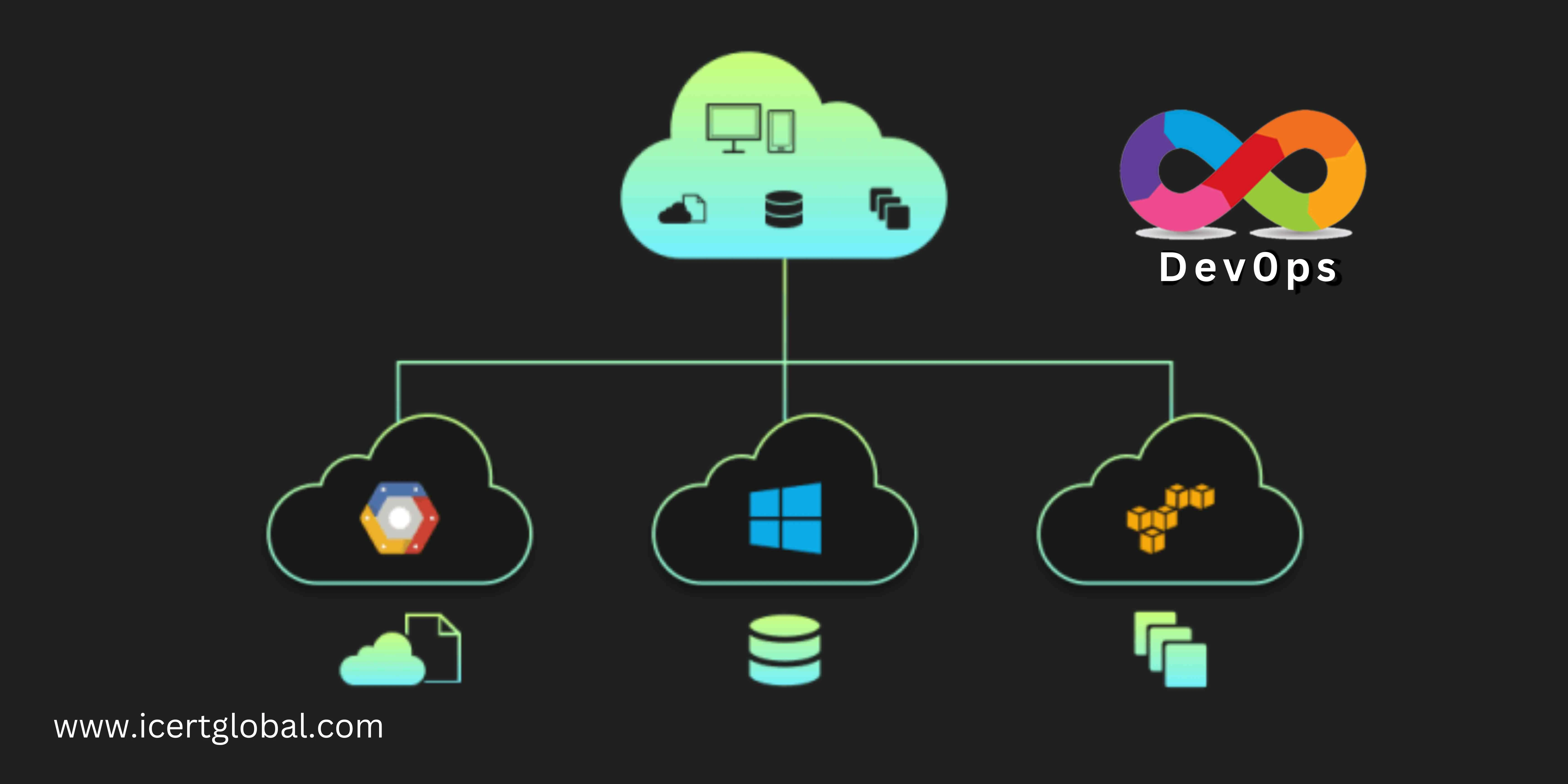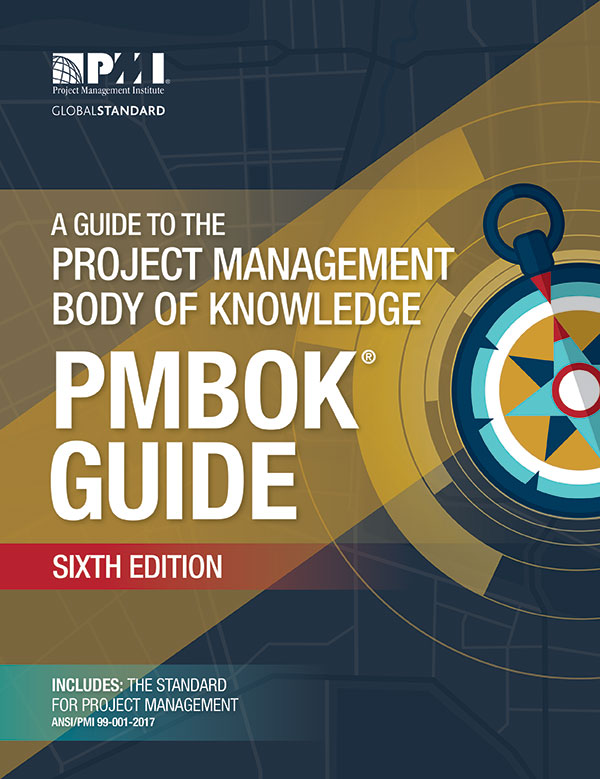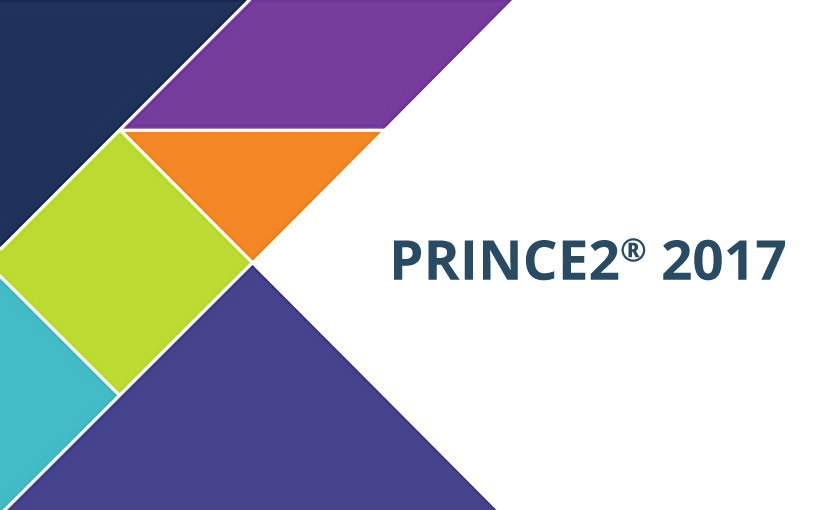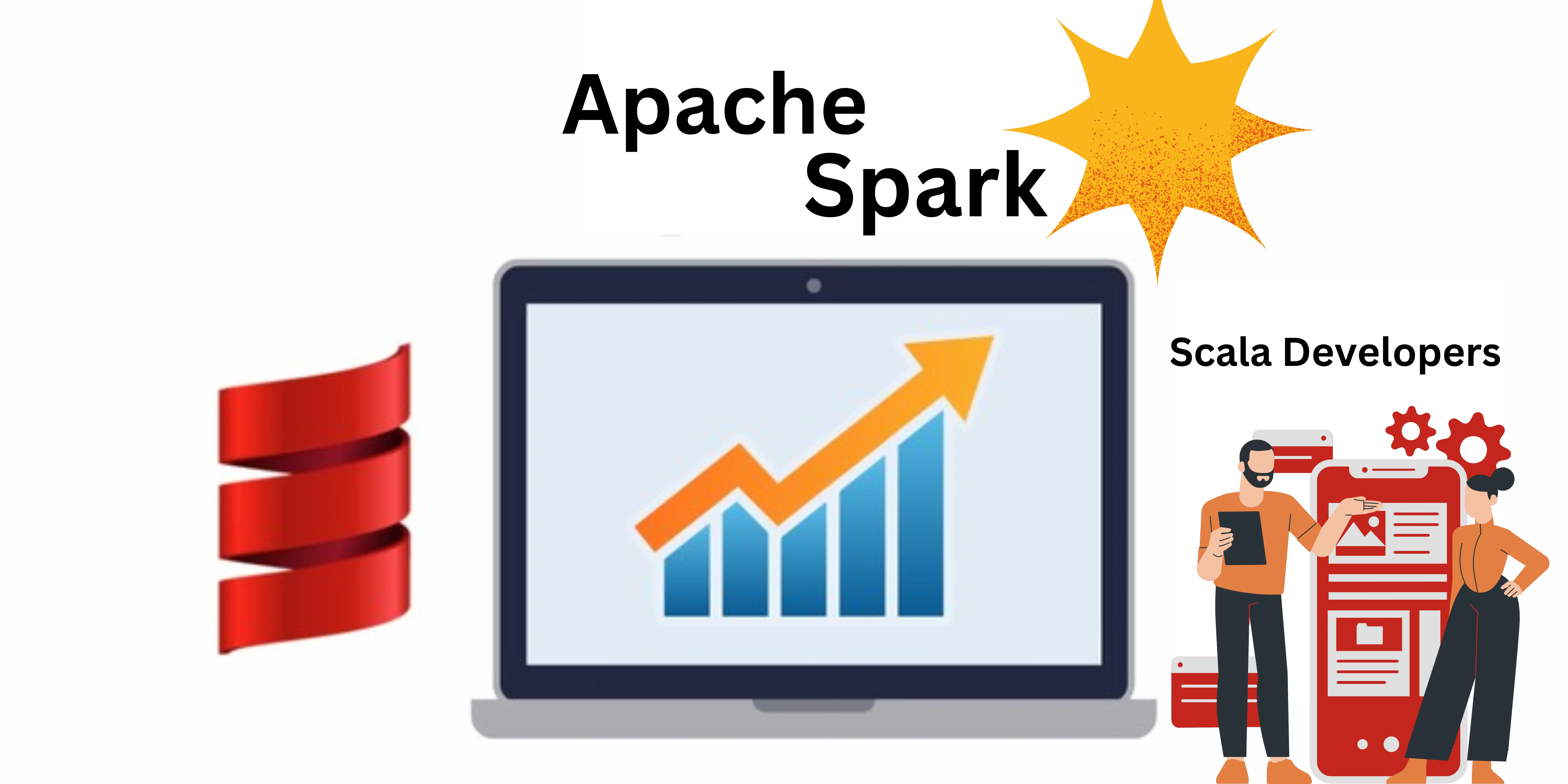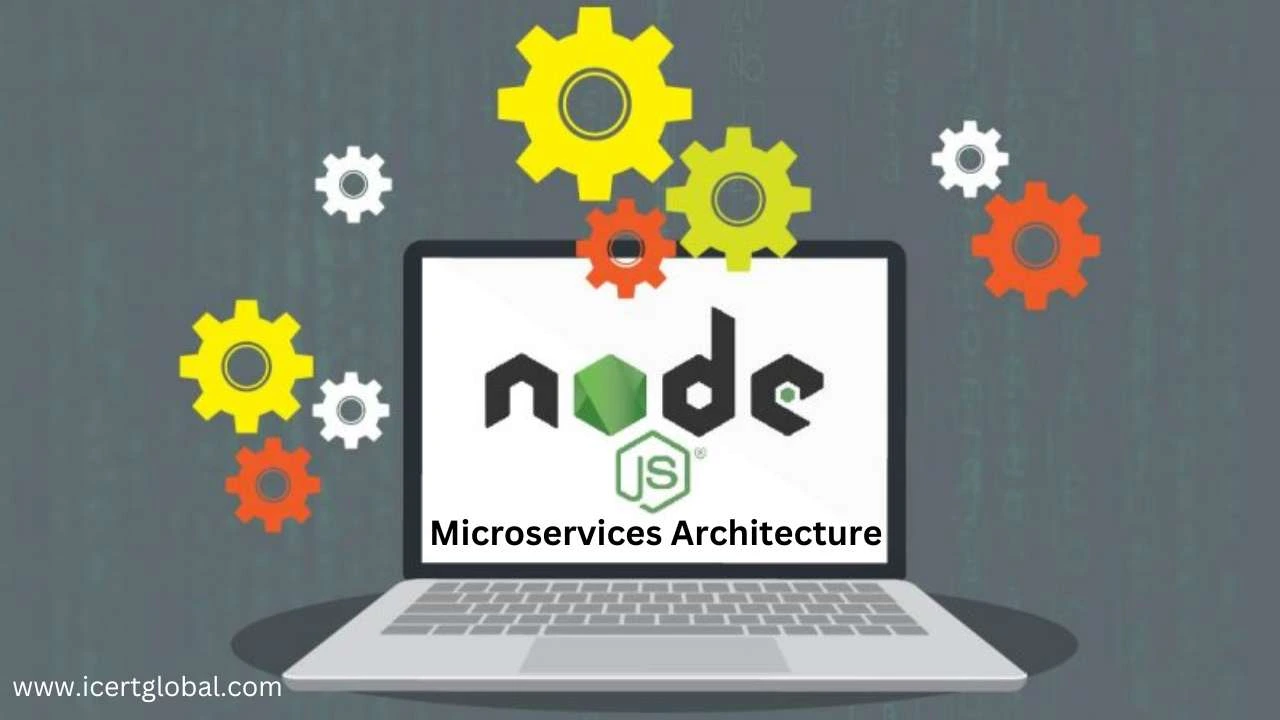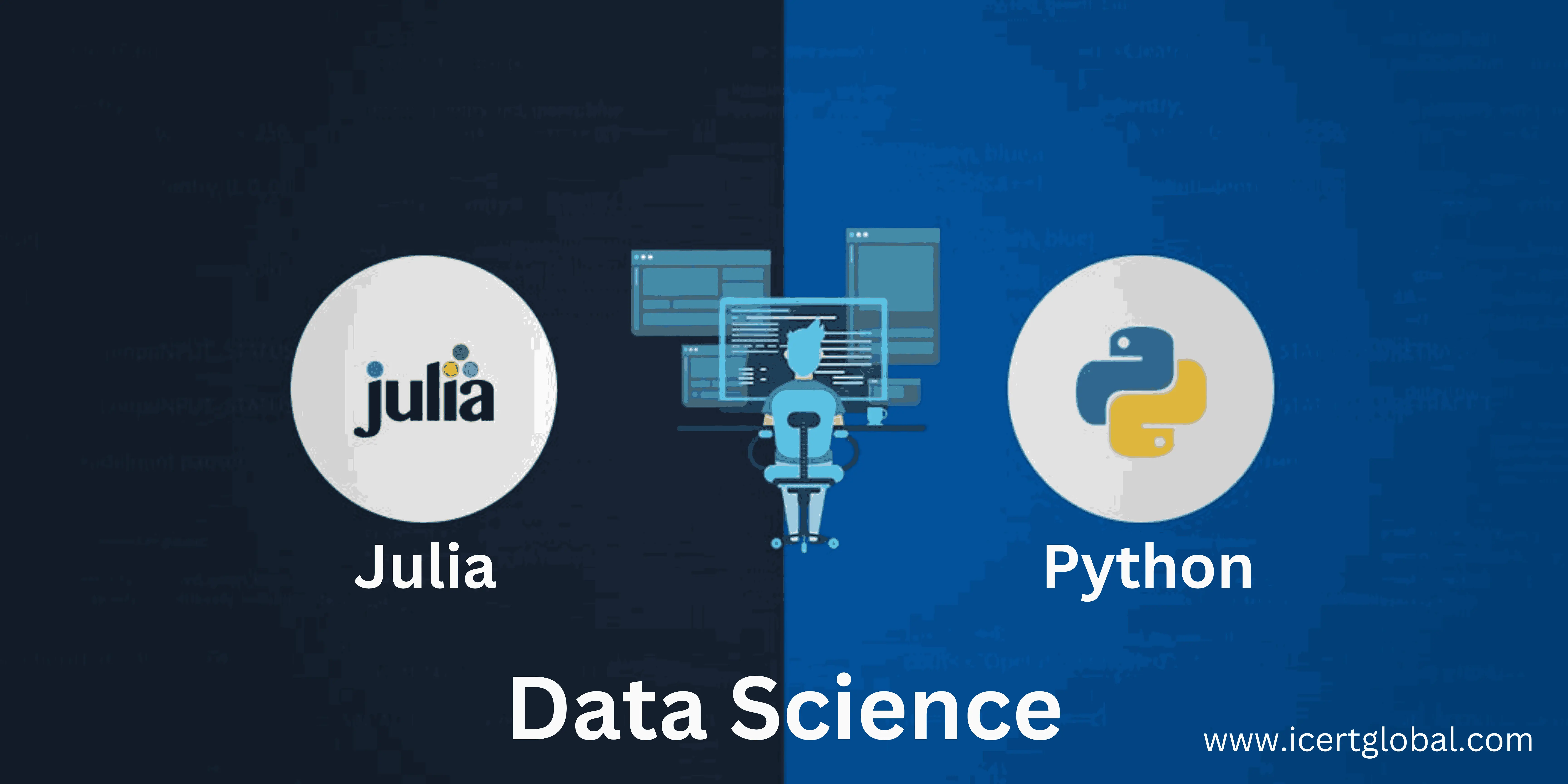Quick Enquiry Form
Categories
- Agile and Scrum (225)
- BigData (36)
- Business Analysis (94)
- Cirtix Client Administration (54)
- Cisco (63)
- Cloud Technology (96)
- Cyber Security (56)
- Data Science and Business Intelligence (53)
- Developement Courses (53)
- DevOps (15)
- Digital Marketing (58)
- Emerging Technology (198)
- IT Service Management (76)
- Microsoft (54)
- Other (395)
- Project Management (502)
- Quality Management (142)
- salesforce (67)
Latest posts
AI Interview Questions You Need..
What Do Hypervisors Do in..
5 Practical Tips to Help..
Free Resources
Subscribe to Newsletter
DevOps is a great career move for growth and opportunities
Any position you pursue in tech is going to require your complete dedication to achieve success.
DevOps area has a lot of growth potential in the future. This holds true for those with programming experience and data/system administrators.
Come to face it, as a developer you need to roll your sleeves and engage with the operations to check if code really complies. And as administrator, it is the practice in large and small organizations to automate the operation, and these days Administrator who and develop fail to contribute more than the prescribed job description. So it’s like developers who can administer or administrators who can develop cant stay competitive nor add value to their organization
DevOps is finding a bridge that can strike that can balance both sides’ expectations. Its about integrating technologies and lets the professionals branch out beyond and find solution to challenges posed in developing and operational aspects. How can they co-exist without affecting the eco-system? It’s not a trade-off, rather a merger of minds aiming to accomplish the same objective that was so far handled independently in the role of developers and operations.
The balance has to be regulated to ensure smooth transitioning. As DevOps professional, you have to carry the mindset of two roles, which means you have to keep pushing the code and ensure smooth running of the operations. It’s like donning two hats at the same time. It may not as simple as stated and needs an expertise and competency in handling both coding and operation, and integrating them in the systems and process, ensuring harmony in execution and outcome/
DevOps to a great extent can pin down the blame game which usually happens, and strive towards contributing to the success of the enterprise ecosystem. DevOps is a recent development and the opportunities are great to tap by professionals with potential.
According to Payscale, the average pay for a Development Operations (DevOps) Engineer is $90,361 per year. With experience, the pay is expected to go up, and skillset in certain tools will have positive impact resulting in a higher pay.
You can visit our website to know more about our DevOps Certification Training program.
Read More
Clients Developing Their Own In-House Technology Skills.
A recent article about IBM was titled the same as of this article. So, there is no claim about the ownership that rightfully belongs to IBM, but the message is clear and universal, and applicable to one and all.
Companies these days are trying to cut down the dependencies. What was once outsourced is now considered to be developed in-house.? Why do we outsource?
Why can’t we? These questions crop-up.
The cost aside, companies are concerned about the control and ownership. It proves cost-effective to get things done outside and hence outsource. The realization has set in that exist an opportunity to hone skills within and companies are willing to invest in their workforce than scout elsewhere. It is to advance their own workforce in terms of skillset and also engage in emerging technologies that corporates are on the lookout for their own “data scientists and architects to be better equipped to work with us to build out these solutions .”
It is impossible to have everything in-house. Practically not possible. Indispensable is a far cry, and hence companies are willing to settle for interdependencies. The eco-system is such that we need one another, but how much of a dependency is acceptable? It5 can be understood from the article that IBM, which is a technology powerhouse, is focused on ‘strategic imperatives - which is building new offerings in analytics, cloud computing, artificial intelligence, blockchain
The question is: are you conversant with these technologies. Analytics, Cloud Computing, Artificial Intelligence, Blockchain seem to be hitting high notes and the need and necessity for a professional certifications in these niche technologies will validate your competencies and vouch for your capabilities, to help your company grow or get into new service lines to maximize business and optimize resources.
iCertGlobal has a slew of professional certifications that covers a gamut of courses from project management to cyber security, to analytics, cloud computing, artificial intelligence, blockchain. Please visit our website www.icertglobal.com to know more about our core offerings and the opportunities for you to make the most and advance your career.
Read More
A recent article about IBM was titled the same as of this article. So, there is no claim about the ownership that rightfully belongs to IBM, but the message is clear and universal, and applicable to one and all.
Companies these days are trying to cut down the dependencies. What was once outsourced is now considered to be developed in-house.? Why do we outsource?
Why can’t we? These questions crop-up.
The cost aside, companies are concerned about the control and ownership. It proves cost-effective to get things done outside and hence outsource. The realization has set in that exist an opportunity to hone skills within and companies are willing to invest in their workforce than scout elsewhere. It is to advance their own workforce in terms of skillset and also engage in emerging technologies that corporates are on the lookout for their own “data scientists and architects to be better equipped to work with us to build out these solutions .”
It is impossible to have everything in-house. Practically not possible. Indispensable is a far cry, and hence companies are willing to settle for interdependencies. The eco-system is such that we need one another, but how much of a dependency is acceptable? It5 can be understood from the article that IBM, which is a technology powerhouse, is focused on ‘strategic imperatives - which is building new offerings in analytics, cloud computing, artificial intelligence, blockchain
The question is: are you conversant with these technologies. Analytics, Cloud Computing, Artificial Intelligence, Blockchain seem to be hitting high notes and the need and necessity for a professional certifications in these niche technologies will validate your competencies and vouch for your capabilities, to help your company grow or get into new service lines to maximize business and optimize resources.
iCertGlobal has a slew of professional certifications that covers a gamut of courses from project management to cyber security, to analytics, cloud computing, artificial intelligence, blockchain. Please visit our website www.icertglobal.com to know more about our core offerings and the opportunities for you to make the most and advance your career.
One skill isn’t enough- unlock more opportunities today!
The human capital, with the exponential growth in population, is immeasurably huge. Today the talent pool is just terrific. Paradoxically, the skill gap persists despite the overwhelming numbers of resources. The issue, as always, is the fitment. The question is: do you fit?
An organization needs vary from time to time, and that’s why the insistence of skills upgrades. Stopping at a place in today’s pace Is walking backward. That spells something about the competition – which means you have to have always in your guard, keep your eyes and ears open and be ready on your toes.
The physical attributes aside, the mental faculty needs to be brushed up and stepped up. Now comes the key question? What are your skills? Everyone is gifted with a primary skill. Problem is we don’t know what we are good at. We just follow the crowd and flow with the tide and knock on doors that have good opportunities – that pays you well offering good positions. So it’s more about aligning your skills towards the direction of boom and bucks.
Win-win for You and your Company
These days, a company is known for its workforce. Clients are setting the minimum requirement of ‘PMP certified’ for a manager, and hiring companies either enforce or set as their basic requirement even at the shortlisting stage. Hence, the certification on your profile is not only a value-add to your person but with the company, you are associated as well. That said, when one key certification used to suffice, today along with the demand, the expectations too have spiraled. “what else?” this goes both ways for the employers and employees. For the investment made on an asset, in the forms of pay and perks, what are the returns on investment (ROI) is a claim rightfully stated by the employer. Likewise, for investing so many hard hours and armed with skillsets, ‘what do I stand to gain in terms of compensation and growth?’. So, it’s a fair expectation both sides with an eye on the bottom-line.
Multifaceted Profile.
There are many a professional who despite experience are unable to stand out for the fact that they aren’t certified. Hence, there is ‘that’ distinguished factor that sets one apart. So, a professional certification can make a huge difference. Compare a PMP certified with that of a non-certified professional/ doesn’t it make a difference. Now add more certifications to your profile aligned with your skill set. Maybe PgMP or PMI-ACP.
Job Opportunities
Many doors will be opened. The job market is skewed with an imbalance in supply versus demand. Skilled professionals are scarce in the industry, and hence the difficulty in sourcing. The niche professional certification holders are fewer in the industry.
Career Advancement
The competitive edge, undoubtedly, stems from the knowledge acquisition. Advanced certification is the measure of depth and applied across a domain. The principles and concepts are applicable to varied industry. You can move places and scale up the ladder, and always the threshold will be an acclaimed and accepted qualification and certification.
There are many such professional certifications depending on the subject matter and areas of interest. The common thread that sews up is the success factor: professionally certified profiles are head above shoulders.
image: www.pexels.com
Read More
Our unique, inimitable, and tailor-made training solutions.
This might be a regular word in the IT industry offering products and solutions. The definition states “made or done to order for a particular customer.” Today, custom-made is cut across the industry fitting to customer specifics.
Just imagine a customer walking into a restaurant and reading through the menu, and calls on the waiter to order something that’s not part of the menu. The Customer doesn’t take NO for an answer if you are really keen on customer service. If it is not listed on the menu, then better cook it – that’s the sense of service in the industry. This is just an analogy that can be applied to any vertical or horizontal.
There is no ‘one size fits for all’ – all these might sound cliches, but the spotlight is back on the customer beaming more brightly than ever before. The customer is king. True, if not for the customer, what will happen to business eco-system? Who drives business? If not for the patronage of the customer, who pays the bills – and that includes salaries.
“We got to think more along the lines of doing something exclusively for the customer.”
The distinct factor and differentiator in an industry dominated by the best in business is your ability to make the customer feel special. Right from sundry stuff to sophisticated schooling, think more along the lines of doing something different that is exciting and exactly meets the customer's requirement.
Interestingly, training too have seen the swing when institutions go out of the way to offer tailor-made training, which is unique and inimitable to the customer in the picture.
The engagement has gone one-notch above. Now customers brief a scenario to exact a solution. It’s like turning a use case into an application – which may sound like an exaggeration. Not anymore.
In a recent inquiry, a customer came out with a specific need that was not part of our offering. In fact, they pinned the scope so neatly that the subject sought was close to 'cherry picking' and bundled as one course, and refusal to entertain their inquiry will make them shift and shop elsewhere. So, what do we do? Either make them understand, which they wont or find some middle ground where both of our objectives are met.
“You must be willing to go as far as you can”
Today, the choice for a customer has grown manifold. If you aren’t ready, move aside, and the next one in line will be inquired. So to a bag a business order, that connects directly or loosely, it’s both important and imperative to make most of the opportunity and drive hard for a closure. It will be foolhardy to dismiss with a ‘sorry, we don’t have that in our catalog”. The missed opportunity could cost us dear. From experience, its always the missed opportunity prove to be the worst casualties. Unless it's completely beyond your strength, you must be willing to go as far as you can. Chances aren’t easy to come by these days with competition throttling and scuttling at the first instant possible. Customer service is evolving. The service provided will be the game changer and excellence will result in the clincher.
One of our customers had an interesting anecdote. He was visiting a gift shop to buy something in particular. The shop owner heard his order, and declared his helplessness as “not available’ and turned his attention to the news on television. The customer moved on to the next door, which too was a gift shop, and that owner too didn’t have the article, but instead of flatly refusing with a ‘No’, he was interested to offer the customer with alternatives of ‘maybe you would like this or try that one.” The spirit of engagement impressed the customer, and even more impressive were the choices presented that the customer never thought of, and in the end, he purchased one and promised to come back. While leaving the shop, he looked at the previous shop and noticed the distinct difference in entrepreneurship. One was willing to go way go way beyond, while the other just sat and did nothing much. The customer left a thank you note to the shopkeeper saying “that looks like it’s just made for me”.
Custom-made, perhaps.
Read More
Who is right? Effective team management and decision-making
Have you ever experienced the conflict within yourself? Many of us would have experienced without realizing what it is. I would like to share few scenarios of my life where I have contradicted myself and how it helped to create the self-awareness within me.
From a personal perspective:
What is Right to me may not be “RIGHT” to my spouse?
I always want my son to do things perfect in his studies and sports which is my primary concern all the time, whereas my spouse always wants to take care of my son’ interests and happiness emotionally. Who is wrong here? None. Who is right? Perhaps, both. We both have very different standpoint but the same mission in the upbringing of our son. Hence, it’s obvious that we get into conflict when I try to impose do things against his interest. To avoid confrontation, which might escalate to arguments, she tends to downplay when I am around and makes the child to complete school work and studies before my return from work.
It is like racing on thin ice. Most of the times, we do our best to avoid the situation that might result in conflict/argument. My spouse' maxims in managing my son need to be balanced with my own principles to instill discipline. Eventually, we respect the institution of marriage/family rather than self. The more we kill the self, the better will be our family life. Is that right? I agree.
From a professional point of view:
What is Right to me may not be “RIGHT” to my employer?
Moving onto a professional realm, what appears right to you may not be so with your colleague or manager. There are always differences in opinion. As the saying goes, “ When two partners always agree, one of them is not necessary."
When the crew has the same objective, there can be a different approach in accomplishments. Conflict or difference of opinion arises in the professional life when the objective, level of urgency and priority differs. Rifts can be resolved when we align, with an open mind that there exist different ways and means to achieve the goal. There is a streak of self-righteousness in all of us, making us ‘Right’ always. Is that right? Certainly not. You must be willing to listen to others’ opinion and perspective and for all you know, they might be right or you can be proven wrong. Its all about objectivity and a sense of rationality.
What I learned so far in my professional life: get your objectives aligned with your Stakeholders' objectives/Vision/Mission to avoid most of the conflicts. When we work in an organization, there could be more ways to achieve the mission and not necessarily only one way. Always focus towards the end results without allowing yourself into petty squabbles of who is Right. It’s alright if you are not right. No one is, for that matter all the time correct. We are not picture perfect with a vision of 20/20. Don’t get deviated. The less we spend on proving self, the more we focus on our objectives & goals and eventually become productive and promising.
We always welcome feedback, and your review will be very much appreciated. Please leave your thoughts here…..
image courtesy: goo.gl/xyWQQ1
Read More
What aspects of PMP make it so appealing to professionals?
We offer a comprehensive PMP® certification program for participants with diverse professional background and different levels of education and experience.
PMP® is consistently ranked as one the top five most valuable certification for IT professionals and is broadly applicable to a wide range of industries.
A PMP® certification builds the skills needed to succeed and opens new doors for those with the certification.
PMP® Certification is very much relevant to all those who are into Project Management irrespective of the fields specialized. Contrary to popular belief that PMP is related to IT/Software Project Managers, it is very much relevant indeed to people who are managing the projects in the fields of Civil, Production or any other domain or industry. That is one of the reasons why people from any field who want to run/execute the project in organized way, want to be training and certifying in PMP®.
Professionals who are still uncertified find themselves at a distinct disadvantage as compared to those who are PMP certified.
What in PMP® attracts the People?
• Following the PMI standards help to have the better predictability. This is one of the reasons why many organizations encourage their project management professionals to go through the PMP Training and certification.
• Risk Management is applicable for all projects irrespective of field or domain. Risk management is one of the key areas which connect all people from different walks into Common Project Management Methodology.
• Communication Management & Stakeholder Management aren't applicable for Project Managers alone but or non-project managers as well . People who know the project management principles defined by PMI are employed across different domains.
• The introduction of agile agile practices in the traditional approaches will present the professionals the opportunity in creating an integrated approach to leverage.
To learn more, click http://goo.gl/GeVrFC
image courtesy: https://www.pexels.com
Read More
Master project management with top-tier certifications.
When you are already a qualified professional, why the need for an accredited certification is the intellectual stew brewing in most the brimming minds. Some are even audacious to declare that no one gets to tell them ‘what they already know’.
You have probably heard it, and I for sure can testify about the lament of a senior manager in the construction industry who managed some awe-inspiring structural creations to his credit as the chief architect “can you believe the boss pushing me to get the PMP certified?”, whilst I was a bystander in that conversation then [2 years before]. Today, employed in the education space, I marvel about that man’s predicament and feel miserable in not empathizing with his plight. The opposite of love is not to hate. It's apathy. Sometimes, we veer off that direction showing total lack of concern or conventional wisdom. If a civil engineer feels the pressing need for a professional certification, try imagining the IT professionals. In all fairness, accreditation makes you suave, savvy and surges your career.
Surely and certainly, PMP® does equip you with the knowledge considered essential and emboldens with a positive spirit to take the ‘corporate bull by its horn’.
Project Management certification courses provide you the best platform to highlight your expertise and place your profile in the spotlight.
Market sentiments reek stronger of the smell that emanates with headlines like *Certified PMPs earn 25% more*.
This message has a ripple effect and resonates all over the valley.
Today project management certified professionals are expected to manage projects of all types. And of course, any methodologies. In fact, PMP certification per se is domain agnostic.
The Egypt Pyramid is a classic example of an excellent project management in the days of Pharaoh when none of the modern tools were available, yet that project is a testament to phenomenal project management.
Presently, the industry with technological advancements and tools and techniques have multiplied in number, and still, there are struggles and hurdles faced managing a project. This article doesn't highlight the pain point in project management, rather it underscores the expertise required for a project manager to manage different projects - which is the minimum expectation.
We would like to know your thoughts….. please leave it in the comments section.
image courtesy: https://www.pexels.com/
Read More
Identify your skills to enhance career growth and success.
The human capital, with the exponential growth in population, is immeasurably huge. Today the talent pool is just terrific. Paradoxically, the skill gap persists despite the overwhelming numbers of resources. The issue, as always, is the fitment. The question is: do you fit? An organization's needs vary from time to time, and that’s why the insistence of skills upgrade. Stopping at a place in today’s pace Is walking backward. That spells something about the competition – which means you have to have always in your guard, keep your eyes and ears open and be ready on your toes. The physical attributes aside, the mental faculty needs to be brushed up and stepped up. Now comes the key question? What are your skills? Everyone is gifted with a primary skill. Problem is we don’t know what we are good at. We just follow the crowd and flow with the tide and knock on doors that have good opportunities – that pays you well offering good positions. So it’s more about aligning your skills towards the direction of boom and bucks.
Have you ever tried to identify your own talents or primary skills and pursue a career where you can flourish given your natural abilities and gifted talents? Today, most of us want to try our hand in IT. Why? Because it pays handsomely, and the scope is just superb. What if you are good at writing? Or painting or fixing wheels or any other vocation? The sense of job satisfaction is a far cry these days because our occupation is marked by demand in the market. What happened to your skills? Either untapped or unused.
So how to identify your skills?
- Whatever you can do with relative ease
- Whatever you are extremely confident
- whatever keeps you going
- Whatever you enjoy doing
- Whatever people come to you often for aid/assistance/assignment
Once you know what you are really good at, nurture. Try getting advice from peers and superiors. Mentoring helps. Remember, there are primary skill and secondary skills. In today’s competitive world, you need to wear more than one hat as a performer. So, learn more skills. Become multi-talented. Versatile. And that makes you more in demand, rather than following the demand of the market. Make them come to you, instead of you approaching them. You know well where lies the bargaining power. job satisfaction is when you really enjoy what you are doing. The feeling of fulfillment or contentment. So identify your skills, initiate in grooming and capitalize on your competency.
Thank you for reading this blog and please leave your thoughts here.
image courtesy: https://www.pexels.com
Read More
- Whatever you can do with relative ease
- Whatever you are extremely confident
- whatever keeps you going
- Whatever you enjoy doing
- Whatever people come to you often for aid/assistance/assignment
Why should you consider getting a PMP certification exam?
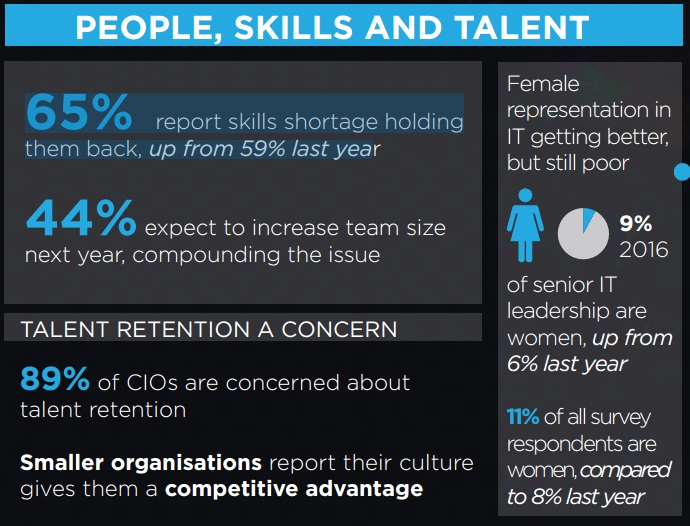 source: KPMG CIO SURVEY
Exploring New Avenues
The latest version of PMBOK-version 6 is a mix of traditional practice and agile methodology It explores ways by which the blended model can be leveraged. Is it possible to have an agile methodology within waterfall? The theory of agile in waterfall in put into test and tried and probably the reason to introduce agile is in all the 10 knowledge areas. The upgrade is both from technology and technical front.
Talent is Top-line
PMP’s exam eligibility criteria are a clear indicator about your prowess and proficiency. Clearing the exam and certifying yourself as PMP professional is is a distinct differentiator. . That’s the kind of talent the industry is scouting. Companies are on the lookout for such professionals who are professionally certified, and PMP stands in the top 5 ranking certification. So, you become the talent that the company wants to tap.
Close the Skill Shortage
Recruiters are finding it increasingly painful in on-boarding the right resource. PMP proves handier in screening and shortlisting. The latest PMP certification acts as a catalyst. There are only 833,025 active PMP certified individuals when the demand far exceeds the supply. Hence, it does make the PMP certified professionals most eligible and elite. On a global scale 833,025 active PMP certified individuals doesn’t really add up to the requirement. And PMP certification has become even more difficult. So, the latest certification will have its own shine and significance.
Earning Power
The PMI global survey clearly states that the median salary of U.S.-based respondents holding a PMP certification was$111,000 versus a median salary of $91,000 for participants without PMP certification. And the difference is obvious. And don’t miss on the perks.
Diversified Platform
The PMP call is not confined o the Information technology space. In fact, any project undertaking would want qualified professionals. So long there is a need for project management professional, be it civil or architecture or IT, PMP certification holds good and commands respect.
Its time for you take up the exam.
source: KPMG CIO SURVEY
Exploring New Avenues
The latest version of PMBOK-version 6 is a mix of traditional practice and agile methodology It explores ways by which the blended model can be leveraged. Is it possible to have an agile methodology within waterfall? The theory of agile in waterfall in put into test and tried and probably the reason to introduce agile is in all the 10 knowledge areas. The upgrade is both from technology and technical front.
Talent is Top-line
PMP’s exam eligibility criteria are a clear indicator about your prowess and proficiency. Clearing the exam and certifying yourself as PMP professional is is a distinct differentiator. . That’s the kind of talent the industry is scouting. Companies are on the lookout for such professionals who are professionally certified, and PMP stands in the top 5 ranking certification. So, you become the talent that the company wants to tap.
Close the Skill Shortage
Recruiters are finding it increasingly painful in on-boarding the right resource. PMP proves handier in screening and shortlisting. The latest PMP certification acts as a catalyst. There are only 833,025 active PMP certified individuals when the demand far exceeds the supply. Hence, it does make the PMP certified professionals most eligible and elite. On a global scale 833,025 active PMP certified individuals doesn’t really add up to the requirement. And PMP certification has become even more difficult. So, the latest certification will have its own shine and significance.
Earning Power
The PMI global survey clearly states that the median salary of U.S.-based respondents holding a PMP certification was$111,000 versus a median salary of $91,000 for participants without PMP certification. And the difference is obvious. And don’t miss on the perks.
Diversified Platform
The PMP call is not confined o the Information technology space. In fact, any project undertaking would want qualified professionals. So long there is a need for project management professional, be it civil or architecture or IT, PMP certification holds good and commands respect.
Its time for you take up the exam.
Read More

Only the Best and Brightest Have Shined in the Valley!
If the new H-1B Visa Bill is anything to go by, then soon there will be visa cap per country issued purely of on merit regardless of the origin. The catch of “only the best and brightest” has been ringing in the valley ever since there was a change of guard in the leadership. This is only fair so that Companies don’t shortchange the unsuspecting employee by undercutting wages. So to book yourself a berth, better ensure you are the best in the list. So, professionally, unless you have a proven track record that’s superior and surpasses the set expectations, chances to be counted in is going to be grim.
Just read out the latest reports as extracted and the enormity of reality will dawn on you. The good days are gone? It can be a lament or do you hear someone shout-out “good days are back”. Your caliber and competency can be vouched by you alone as it will be you who will be subjected to the litmus test in proficiency.
Quoting verbatim from the source:
“The High-Skilled Integrity and Fairness Act of 2017 introduced by California Congressman Zoe Lofgren prioritises market based allocation of visas to those companies willing to pay 200 per cent of a wage calculated by survey; eliminates the category of lowest pay; and raises the salary level at which H-1B dependent employer are exempt from non-displacement and recruitment attestation requirements to greater than $130,000.
This is more than double of the current H-1B minimum wage of $60,000, which was established in 1989 and since then has remained unchanged.
“My legislation refocuses the H-1B programme to its original intent — to seek out and find the best and brightest from around the world, and to supplement the US workforce with talented, highly paid, and highly skilled workers who help create jobs here in America, not replace them,” said Mr. Lofgren.
Here comes the zinger: when the message is loud and clear about scouting talent that the best and brightest, what makes one best and bright? In simpler terms, you can’t nudge or elbow your competitor but win the race by a mile. The hunger to excel and exceed expectation is the basic expectation. You can take it from here as the baseline and figure out the challenges that lie ahead and criteria to be met. Nothing less than outstanding can help you outshine as a luminary in the global pool of star players.
If you feel tempted to ask ‘what talents will take me through?’, then walk through the Job Responsibilities and measure yourself in terms of the weightage, and ask yourself “are you there?” if yes, what’s your standing when lined up with strongest of contender? Certifications, of course, lend currency and expertise arises from the virtue of experience. What happens, if the shortlisted candidates possess the certifications and areas of expertise? Well, that its typical Darwinism “fitter than the fittest”. Better than the best. Prove that and take home the trophy. The winner gets it all.
We wish to hear from you. Please leave your thoughts here.....
image courtesy: goo.gl/mQwzXi
Read More
The value of PMP certification in 2018 and its career impact
We were classmates since kindergarten. And hung around together. Its our individual pursuits that led us into different league – and today as working adults we catch up good old times and reminisce about the days of yore. He is a seasoned professional, and the very title of ‘Director’ made me size him up and down. As small talk whittled and we started discussing about professional journeys embarked, certain details shared with me were just startling.
He is employed in a fortune 500 company, and has a dedicated recruiting team. For reasons known best to him, the discourse focused on the frustration of a recruiter. Now that beats me!! With the talent in the market, it must be a breeze in the park to shop – in fact, ‘pick and choose’. “Far from it. Reality is grim my friend. I give a mandate to the recruiter team and from the heap of resume they receive, and after vetting with due diligence, I only get to pick 30. A number I set for myself so that the scrutiny is really stiff”. Engrossed, I didn’t realize the tea was getting cold but questioned “what’s the pain point?”
“It’s the fitment. The candidate must be primarily from our domain to be completely conversant, independently handle client, responsible for end-to-end to project implementation, and toss in portfolio management….” And I was muttering “be read to go to moon or mars in a days’ notice”, but he completes “and must be PMP certified.”
Though he kept PMP certification to the last, it was very apparent that without PMP, the candidate wouldn’t even be considered. The resume cast away as one among the many who couldn’t make it despite the experience bereft the PMP certification.
Catching up from where we left last, this article will present our findings of the advantages with a PMP certification in terms of recognition and compensation and to summarize, the jump 0f 20% increase in salary. Consider these pointers and the infographics [sourced from Payscale, Glassdoor, salary.com, careerbuilder, Angel List, robert Half company],
By now, its evident every aspirant or practicing professional project manager knows what really makes the cut above the crew – PMP® certification.
- Check your earning and see your salary soar. PMP certified professionals command a distinctive lead that’s difficult to catch up in terms of salary. Easily a PMP certified professionals earns 20 % more than a no-certified
- PMP® plays a pivotal role in marketing your profile. It matters much a how can grab the eyeballs and retain the attention. PMP is more than a selling point. When complemented well, it will be a slam-dunk.
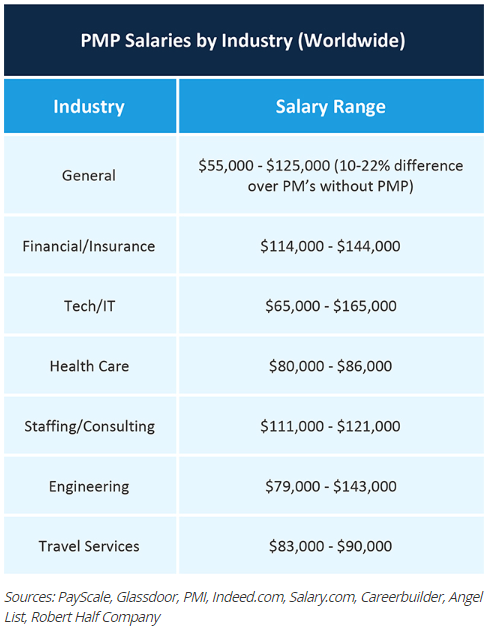
- PMP® Certification holders are largely presumed to be conversant with the subject matter because of the stiff eligibility criteria, random audits and the tough exam wherein passing at the first attempt is deemed a major accomplishment.
- PMP® proves you are a qualified professional and hence eligible to be counted as a prospect to lead projects and groomed to take up larger roles and responsibilities
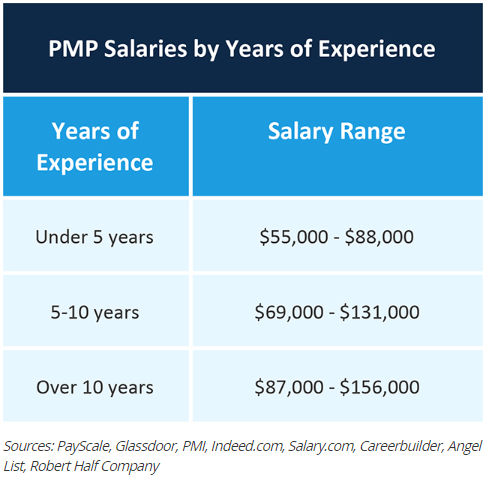
- PMP® provides job opportunities that are terrific because the number of certified PMPs is just a small number and hence you are in great demand
- You get to work in challenging projects by virtue of the certification as it is a testimony to your education, experience and expertise.
- It broadens your horizons given that PMP is globally acknowledged and instantly recognized. With every engagement, you broaden your skills and upgrade your learning.
 It benefits your employers who are keen about their ROI with an eye on the bottom-line. Remember, you are a true asset to your employer as you enable the company to complete the project within time and cost, of course leading a team and as a team player.
Now that you are become a part of the exclusive global community of PMP holders, the future is all yours. Steer your way through and chart your own course.
cover image courtesy: goo.gl/r5jSGU
It benefits your employers who are keen about their ROI with an eye on the bottom-line. Remember, you are a true asset to your employer as you enable the company to complete the project within time and cost, of course leading a team and as a team player.
Now that you are become a part of the exclusive global community of PMP holders, the future is all yours. Steer your way through and chart your own course.
cover image courtesy: goo.gl/r5jSGU
Read More
Catching up from where we left last, this article will present our findings of the advantages with a PMP certification in terms of recognition and compensation and to summarize, the jump 0f 20% increase in salary. Consider these pointers and the infographics [sourced from Payscale, Glassdoor, salary.com, careerbuilder, Angel List, robert Half company],
- Check your earning and see your salary soar. PMP certified professionals command a distinctive lead that’s difficult to catch up in terms of salary. Easily a PMP certified professionals earns 20 % more than a no-certified
- PMP® plays a pivotal role in marketing your profile. It matters much a how can grab the eyeballs and retain the attention. PMP is more than a selling point. When complemented well, it will be a slam-dunk.

- PMP® Certification holders are largely presumed to be conversant with the subject matter because of the stiff eligibility criteria, random audits and the tough exam wherein passing at the first attempt is deemed a major accomplishment.
- PMP® proves you are a qualified professional and hence eligible to be counted as a prospect to lead projects and groomed to take up larger roles and responsibilities

- PMP® provides job opportunities that are terrific because the number of certified PMPs is just a small number and hence you are in great demand
- You get to work in challenging projects by virtue of the certification as it is a testimony to your education, experience and expertise.
- It broadens your horizons given that PMP is globally acknowledged and instantly recognized. With every engagement, you broaden your skills and upgrade your learning.

Boss or Leader: Understanding Different Leadership Styles.
Usually, Boss is used as a moniker about the one who lords around or tries to throw the weight by trying to herd.
The Boss, in the titular role, doesn’t have to be bossy as mostly misunderstood. Our perception of ‘Boss’ is more about command and control. The Boss is synonymous with Leader. The line that does the round is that Boss ‘tells you what to do’, while the Leader ‘teaches you why and how to di it.’ This is still in theory. Somehow that title of Boss is very unsettling.
But just like different times calls for different actions, and sometimes different actors, a leader turns more as a boss in cracking the whip should the situation mandate. It is often confused being a Boss is bad, and the leader truly benevolent. It’s a very fine line between being a boss and leader. In fact the line blurs. How does one define autocratic leadership then?
There are many leadership styles: Autocratic, Democratic, Strategic, Transformational, Laissez-faire. The boss can follow any such leadership style or may be all but applicable to the audience 9read as employees).
Are all employees the same?
The 80/20 is very much present as inferred from the performance – meaning, 80% of the workload is usually assigned to 20% of staff. Why? Because they are ‘the’ performers. Notice carefully and you will find it hard to dispute that the one who is hardworking and consistent on deliver is always assigned more work. Why? Because of the delivery. Company needs employees who are able, reliable and consistent in performance. Employees are always a mix and match . while some perform, some outperform and some don’t perform at all. Accordingly, the Boss has to adopt different leadership styles.
It will be very unfair to portray the boss in a poor light just because he/she is unfairly and unreasonably demanding. Some Boss scream “I want it and want it now” without realizing the magnitude of work or plainly pushing their luck. But it can go as far as possible. If shouting and screaming works, then work place will be a street fight so chaotic that your differentiating factor as a Leader will be your decibel level.
Command and Control
This IS required to the ones who need jumpstart. They can’t do it by themselves and some push to move forward. In the worst case, push becomes a shove. That’s where the ‘Command and Control’ is exercised. “if you don’t do it, then..” might sound as a threat but with some staff this works. Whipping works. These are poor in self-esteem, lack confidence and hang in there for survival. And they know well, that getting another job or alternatives is hard to come by and hence respond to the command. It is the fear of getting fired that somehow extracts the work. Hence, it is useful to such work force – usually new joinee, entry-level , fresher or experienced hires who are yet to adapt to the new surroundings.
Democratic
Leadership through consensus by winning confidence and gaining ‘buy-in’ of the team. This team is mature and self-starters. They don’t need someone to be behind their back to get the job done. Once delegated, they are on their own and ensure it is done with minimal intervention and supervision. Accountability is usually high, and the team takes pride in its performance.
Laissez-faire
This is not commonly practices and usually associated with researches and their ilk. Such resources are very independent from the start and don’t need any intervention or monitoring, mostly, the engagement will be time-bound and hence the Boss will have very less scope with regard to delegation or follow-up.
So what kind of a Boss are you?
Brutal, demanding, ruthless, callous, difficult, tough, harsh and aggressive? Just look around and how many faces can your eyes meet and count. The Boss is responsible for the cycle of business with the feet on the pedal. At one stroke the boss has to face so many faces. Possible? That’s why that person is the Boss. And yes, it takes some aggression and ruthlessness to get the job done weighing in the 80/20 rule. ‘The one who shows mercy on others denies oneself’ – doesn’t mean callous in attitude. Though caring, they appear callous else the workforce becomes complacent.
Agreed, some Bosses are obnoxious, petty-minded, self-centered and can’t think beyond business. But then, it’s unfair to stereotype the Boss in such fashion. Some bosses are gentle, willing with en ear to hear, and simply wonderful. The Boss, too, is a human with family to tend and friends to catch up. It is just that they burn more hours and sacrifice so much so that can draw a salary.
Don’t bother. A boss is as much a leader with a different kind of flavor.
Do you agree? Please share your thoughts by leaving a comment.
Read More
Usually, Boss is used as a moniker about the one who lords around or tries to throw the weight by trying to herd.
The Boss, in the titular role, doesn’t have to be bossy as mostly misunderstood. Our perception of ‘Boss’ is more about command and control. The Boss is synonymous with Leader. The line that does the round is that Boss ‘tells you what to do’, while the Leader ‘teaches you why and how to di it.’ This is still in theory. Somehow that title of Boss is very unsettling.
But just like different times calls for different actions, and sometimes different actors, a leader turns more as a boss in cracking the whip should the situation mandate. It is often confused being a Boss is bad, and the leader truly benevolent. It’s a very fine line between being a boss and leader. In fact the line blurs. How does one define autocratic leadership then?
There are many leadership styles: Autocratic, Democratic, Strategic, Transformational, Laissez-faire. The boss can follow any such leadership style or may be all but applicable to the audience 9read as employees).
Are all employees the same?
The 80/20 is very much present as inferred from the performance – meaning, 80% of the workload is usually assigned to 20% of staff. Why? Because they are ‘the’ performers. Notice carefully and you will find it hard to dispute that the one who is hardworking and consistent on deliver is always assigned more work. Why? Because of the delivery. Company needs employees who are able, reliable and consistent in performance. Employees are always a mix and match . while some perform, some outperform and some don’t perform at all. Accordingly, the Boss has to adopt different leadership styles.
It will be very unfair to portray the boss in a poor light just because he/she is unfairly and unreasonably demanding. Some Boss scream “I want it and want it now” without realizing the magnitude of work or plainly pushing their luck. But it can go as far as possible. If shouting and screaming works, then work place will be a street fight so chaotic that your differentiating factor as a Leader will be your decibel level.
Command and Control
This IS required to the ones who need jumpstart. They can’t do it by themselves and some push to move forward. In the worst case, push becomes a shove. That’s where the ‘Command and Control’ is exercised. “if you don’t do it, then..” might sound as a threat but with some staff this works. Whipping works. These are poor in self-esteem, lack confidence and hang in there for survival. And they know well, that getting another job or alternatives is hard to come by and hence respond to the command. It is the fear of getting fired that somehow extracts the work. Hence, it is useful to such work force – usually new joinee, entry-level , fresher or experienced hires who are yet to adapt to the new surroundings.
Democratic
Leadership through consensus by winning confidence and gaining ‘buy-in’ of the team. This team is mature and self-starters. They don’t need someone to be behind their back to get the job done. Once delegated, they are on their own and ensure it is done with minimal intervention and supervision. Accountability is usually high, and the team takes pride in its performance.
Laissez-faire
This is not commonly practices and usually associated with researches and their ilk. Such resources are very independent from the start and don’t need any intervention or monitoring, mostly, the engagement will be time-bound and hence the Boss will have very less scope with regard to delegation or follow-up.
So what kind of a Boss are you?
Brutal, demanding, ruthless, callous, difficult, tough, harsh and aggressive? Just look around and how many faces can your eyes meet and count. The Boss is responsible for the cycle of business with the feet on the pedal. At one stroke the boss has to face so many faces. Possible? That’s why that person is the Boss. And yes, it takes some aggression and ruthlessness to get the job done weighing in the 80/20 rule. ‘The one who shows mercy on others denies oneself’ – doesn’t mean callous in attitude. Though caring, they appear callous else the workforce becomes complacent.
Agreed, some Bosses are obnoxious, petty-minded, self-centered and can’t think beyond business. But then, it’s unfair to stereotype the Boss in such fashion. Some bosses are gentle, willing with en ear to hear, and simply wonderful. The Boss, too, is a human with family to tend and friends to catch up. It is just that they burn more hours and sacrifice so much so that can draw a salary.
Don’t bother. A boss is as much a leader with a different kind of flavor.
Do you agree? Please share your thoughts by leaving a comment.
iCertGlobal wins India Education Awards 2018 | Success story
"The India Education Awards is a celebration of excellence "

Awards are telling reminders – to let us know what we are and who we are.
iCertGlobal Pvt Ltd was presented the India Education Awards -2018 in a star studded ceremony on April 8, 2018 organized by Blindwink Solutions Private Limited. The India Education Awards 2018, conceived and initiated by Blindwink is aimed at felicitating excellence, reputation and exemplary work in the Education Sector.

CEO Speak
“Awards are true inspirations that acknowledges to the world that we are worthy of recognition through our consistent results and outstanding contribution for all-round excellence in academic pursuits. We accept it as an appreciation of our continual commitment and dedicated service in the realm of education.
“We take this moment to thank our people and patrons; our colleagues and clients; staff and stakeholders. They are the ones to push the edge of the envelope, move the needle to beat projections and forecasts and continue to inspire us to strive to do better. Their dedication and support has contributed to our success. Our heartfelt congratulations to the team, and sincere thanks to all those who made this possible” said Irfan Sharief, the CEO of the company.
Company Profile
iCertGlobal, is one of the leading professional certification training providers, offering several programs to corporate and consumers. Based out of Houston, Texas, US, and operations in UK, Australia, APAC and India, iCertGlobal has a global imprint across the globe.
iCertGlobal conducts professional trainings on varied and diverse list from Project Management, Service Management, Quality Management, Agile & Scrum and Niche technologies. They are active in both B2B (Business to Business) and B2C (Business to Consumers) models, and successfully trained more than 75,000 professionals with more than 3,000,000 quality hours of active training, spread across strategic locations like Malaysia, Singapore, Dubai, Abu Dhabi, Saudi Arabia, India, Australia, UK and US.
Read More
"The India Education Awards is a celebration of excellence "

Awards are telling reminders – to let us know what we are and who we are.
iCertGlobal Pvt Ltd was presented the India Education Awards -2018 in a star studded ceremony on April 8, 2018 organized by Blindwink Solutions Private Limited. The India Education Awards 2018, conceived and initiated by Blindwink is aimed at felicitating excellence, reputation and exemplary work in the Education Sector.

CEO Speak
“Awards are true inspirations that acknowledges to the world that we are worthy of recognition through our consistent results and outstanding contribution for all-round excellence in academic pursuits. We accept it as an appreciation of our continual commitment and dedicated service in the realm of education.
“We take this moment to thank our people and patrons; our colleagues and clients; staff and stakeholders. They are the ones to push the edge of the envelope, move the needle to beat projections and forecasts and continue to inspire us to strive to do better. Their dedication and support has contributed to our success. Our heartfelt congratulations to the team, and sincere thanks to all those who made this possible” said Irfan Sharief, the CEO of the company.
Company Profile
iCertGlobal, is one of the leading professional certification training providers, offering several programs to corporate and consumers. Based out of Houston, Texas, US, and operations in UK, Australia, APAC and India, iCertGlobal has a global imprint across the globe.
iCertGlobal conducts professional trainings on varied and diverse list from Project Management, Service Management, Quality Management, Agile & Scrum and Niche technologies. They are active in both B2B (Business to Business) and B2C (Business to Consumers) models, and successfully trained more than 75,000 professionals with more than 3,000,000 quality hours of active training, spread across strategic locations like Malaysia, Singapore, Dubai, Abu Dhabi, Saudi Arabia, India, Australia, UK and US.
Leadership & Continuous Learning for Personal Growth Journey
Its not the frustration over failures.
Its not the mistakes. Its not even the repeated mistakes.
Incredibly it’s the repeat of the repeated mistake – like typos in a perfectly proof-read post. Darn! How did the error creep on?
Well, a pilot missed his destination by messing up the co-ordinate, and this is not without precedent. Imagine the shock of the passengers and the people in general “how could he possibly goof up on the guidance? Isn’t the computer on?”
Incredulous.
That’s how we are sometimes. Knowingly doing things wrong is inexcusable, but knowing well and still getting things wrong is indefensible. That’s where we go weak on our knees. Tensions run high. Anger flare up. Heated arguments and bruised souls.
Now that the pilot has landed in the wrong destination, will all the fury unleashed help in recovering from the loss and land in the right spot?
May be get more processes in place. More check and balance. Make it foolproof that alerts can’t just be missed, so that mistakes won’t be repeated. As much as plans and process are prepared, we can’t absolve ourselves of the blame citing causes or excuses. Negligence is negligence. It can’t be negated, and only corrected.
We need to learn from our mistakes, or from others’ mistakes, and of all repeat mistakes.
A True Leader Never stops Learning. Their call to actions is always influenced by their learning and they constantly try to improvise in thought and act
Leadership and Learning are indispensable to each other – John F kennedy.
Please do share your thoughts by leaving your comment....
image courtesy: BrainyQuote.com
Read More
Its not the frustration over failures.
Its not the mistakes. Its not even the repeated mistakes.
Incredibly it’s the repeat of the repeated mistake – like typos in a perfectly proof-read post. Darn! How did the error creep on?
Well, a pilot missed his destination by messing up the co-ordinate, and this is not without precedent. Imagine the shock of the passengers and the people in general “how could he possibly goof up on the guidance? Isn’t the computer on?”
Incredulous.
That’s how we are sometimes. Knowingly doing things wrong is inexcusable, but knowing well and still getting things wrong is indefensible. That’s where we go weak on our knees. Tensions run high. Anger flare up. Heated arguments and bruised souls.
Now that the pilot has landed in the wrong destination, will all the fury unleashed help in recovering from the loss and land in the right spot?
May be get more processes in place. More check and balance. Make it foolproof that alerts can’t just be missed, so that mistakes won’t be repeated. As much as plans and process are prepared, we can’t absolve ourselves of the blame citing causes or excuses. Negligence is negligence. It can’t be negated, and only corrected.
We need to learn from our mistakes, or from others’ mistakes, and of all repeat mistakes.
A True Leader Never stops Learning. Their call to actions is always influenced by their learning and they constantly try to improvise in thought and act
Leadership and Learning are indispensable to each other – John F kennedy.
Please do share your thoughts by leaving your comment....
image courtesy: BrainyQuote.com
Protect against data theft with top defense strategies!
Some of the recent headlines were so shocking that made stunned people all over the world. The links are presented for anyone who cares to read further and know for themselves.
Industrial espionage goes a long way back to the mid-90s [remember the incident in Intel when one of the employees tried to sell sensitive documents to competitor].
How did Volkswagen dupe millions of car owners, flout stringent US norms?
Apple hack exposes flaws in building apps behind 'Great Firewall'
Apple Removes 300 Infected Apps from App Store | WIRED
Apple Targeted as Malware Infects China Mobile Apps - WSJ
In the digital era, the cybercrime is quite steep given the climbing numbers and catastrophic consequences. The links listed aren't of distant past but relatively new - some or still unveiling and some under investigation. What shocks the learned and layperson is when technology is no longer nascent why the threat should not be nipped in the bud? Nipped?! These bloopers don’t blossom from a bud – be it insider job or outsider, but come to light after shaking our faith and foundation.
The worst threat for now is the cyber threat and measures are mounted to step up cyber security despite which the crime rate scaling is both puzzling and perplexing. If there are breaches in security, the damage could be colossal, making it mandate in tying the loose ends. The best anti-virus is unable to prevent a malware from harming the programs; the best social engineering is not able to mitigate but only makes lives miserable. Ashley Madison hack’s ramification ruined personal life and which is an intrusion into privacy and revelation is damning both to the customers and commerce. When powerhouses like apple’s app store with a reputation of rigid and robust ‘firewall’ is no longer impregnable, anything can be infiltrated, and as endorsers or end-users we lost our insulation and immunity.
Software is susceptible
Every software is susceptible and hardware vulnerable? So where is the power of protection? Unfortunately there is no anti-dote ready that can anticipate attack and annihilate the assailant. Surely some minds are busy at ‘work-is-in-progress’ in chalking out a solution. A more complex encryption or safe vault or something very innovative and effective. When the shadow of the danger grows in size threat looms large.
Disturbing as it gets for the very hand trusted was the one that gave it away. One can defend from outside but how to discern that ‘insider’. Even after closing all gaps, plugging holes, locking doors, securing and sanitizing, how does that slip happen and that too under our very nose? TECHNOLOGY.
Technology is always a double-edged sword. The insiders also use ‘Cloud’ facilities to make away with their goodies. Cloud services are proving to be almost indispensable. Line up the companies offering cloud capabilities and it will feature the heavyweights in the industry: Amazon, Microsoft, apple. So as a safety chute should we just shut down access to the services so that any possible ‘breach’ prevented? Or restrict access? The sanction of cloud services are strictly on need and merit and of course trust.
The vast majority of cloud services don’t encrypt data (as opposed to in transmission), only 15% support multi-factor authentication, and even fewer (6%) are ISO certified, says Sky high CEO Rajiv Gupta. (ISO 27001 was created in 2013 to ensure that security risks and threats to the business are assessed and managed, that physical security processes such as restricted access are enforced consistently, and that audits are conducted regularly.) [source : https://hbr.org/2015/09/what-do-you-do-when-employees-start-using-a-free-cloud-service]
Because it’s so difficult to monitor and regulate employees’ use of file-sharing sites and other cloud services, many CIOs grapple with the whole issue.
So what are the defence mechanisms with regard to data security in cloud?
Data hashing is a technology that creates a hash, or specific code, to identify a given dataset. This allows the integrity of the data to be checked every time the data is used or accessed by a credential individual at the firm. Hashing would prevent data from being changed by an unauthorized third party.
Digital watermarks allow data to be tracked. While this approach does not protect the data, it does allow it to be linked back to the individual who placed it on a cloud or at an unsanctioned location, making that person potentially responsible for any consequences to the data’s misappropriation.
Researchers are attempting to create simple yet effective means of facilitating cross-cloud single-sign-on authentication, where a “foreign” cloud provider is required to gain trusted third-party status from the “home” cloud before being able to communicate with the user and the user’s applications.
Still the advice holds well that sensitive and critical data is guarded and under heavy security and scrutiny.
SalesForce recently introduced Salesforce Shield to protect its cloud apps assuring users that the encryption is by far the best and chances of breach is very slim. But can it be slammed down from slim to simply impossible?
We scratched the surface with regard to Data Defence with Cloud based survives. In the next post, let us look at ways to safeguard out data against any attack.
We welcome your thoughts about Data Security…..
image courtesy: https://destekhizmeti.com/bilgi-guvenligi-hizmetleri
Read More
Some of the recent headlines were so shocking that made stunned people all over the world. The links are presented for anyone who cares to read further and know for themselves.
Industrial espionage goes a long way back to the mid-90s [remember the incident in Intel when one of the employees tried to sell sensitive documents to competitor].
How did Volkswagen dupe millions of car owners, flout stringent US norms?
Apple hack exposes flaws in building apps behind 'Great Firewall'
Apple Removes 300 Infected Apps from App Store | WIRED
Apple Targeted as Malware Infects China Mobile Apps - WSJ
In the digital era, the cybercrime is quite steep given the climbing numbers and catastrophic consequences. The links listed aren't of distant past but relatively new - some or still unveiling and some under investigation. What shocks the learned and layperson is when technology is no longer nascent why the threat should not be nipped in the bud? Nipped?! These bloopers don’t blossom from a bud – be it insider job or outsider, but come to light after shaking our faith and foundation.
The worst threat for now is the cyber threat and measures are mounted to step up cyber security despite which the crime rate scaling is both puzzling and perplexing. If there are breaches in security, the damage could be colossal, making it mandate in tying the loose ends. The best anti-virus is unable to prevent a malware from harming the programs; the best social engineering is not able to mitigate but only makes lives miserable. Ashley Madison hack’s ramification ruined personal life and which is an intrusion into privacy and revelation is damning both to the customers and commerce. When powerhouses like apple’s app store with a reputation of rigid and robust ‘firewall’ is no longer impregnable, anything can be infiltrated, and as endorsers or end-users we lost our insulation and immunity.
Software is susceptible
Every software is susceptible and hardware vulnerable? So where is the power of protection? Unfortunately there is no anti-dote ready that can anticipate attack and annihilate the assailant. Surely some minds are busy at ‘work-is-in-progress’ in chalking out a solution. A more complex encryption or safe vault or something very innovative and effective. When the shadow of the danger grows in size threat looms large.
Disturbing as it gets for the very hand trusted was the one that gave it away. One can defend from outside but how to discern that ‘insider’. Even after closing all gaps, plugging holes, locking doors, securing and sanitizing, how does that slip happen and that too under our very nose? TECHNOLOGY.
Technology is always a double-edged sword. The insiders also use ‘Cloud’ facilities to make away with their goodies. Cloud services are proving to be almost indispensable. Line up the companies offering cloud capabilities and it will feature the heavyweights in the industry: Amazon, Microsoft, apple. So as a safety chute should we just shut down access to the services so that any possible ‘breach’ prevented? Or restrict access? The sanction of cloud services are strictly on need and merit and of course trust.
The vast majority of cloud services don’t encrypt data (as opposed to in transmission), only 15% support multi-factor authentication, and even fewer (6%) are ISO certified, says Sky high CEO Rajiv Gupta. (ISO 27001 was created in 2013 to ensure that security risks and threats to the business are assessed and managed, that physical security processes such as restricted access are enforced consistently, and that audits are conducted regularly.) [source : https://hbr.org/2015/09/what-do-you-do-when-employees-start-using-a-free-cloud-service]
Because it’s so difficult to monitor and regulate employees’ use of file-sharing sites and other cloud services, many CIOs grapple with the whole issue.
So what are the defence mechanisms with regard to data security in cloud?
Data hashing is a technology that creates a hash, or specific code, to identify a given dataset. This allows the integrity of the data to be checked every time the data is used or accessed by a credential individual at the firm. Hashing would prevent data from being changed by an unauthorized third party.
Digital watermarks allow data to be tracked. While this approach does not protect the data, it does allow it to be linked back to the individual who placed it on a cloud or at an unsanctioned location, making that person potentially responsible for any consequences to the data’s misappropriation.
Researchers are attempting to create simple yet effective means of facilitating cross-cloud single-sign-on authentication, where a “foreign” cloud provider is required to gain trusted third-party status from the “home” cloud before being able to communicate with the user and the user’s applications.
Still the advice holds well that sensitive and critical data is guarded and under heavy security and scrutiny.
SalesForce recently introduced Salesforce Shield to protect its cloud apps assuring users that the encryption is by far the best and chances of breach is very slim. But can it be slammed down from slim to simply impossible?
We scratched the surface with regard to Data Defence with Cloud based survives. In the next post, let us look at ways to safeguard out data against any attack.
We welcome your thoughts about Data Security…..
image courtesy: https://destekhizmeti.com/bilgi-guvenligi-hizmetleri
Agile is the trend shaping modern project management today
It’s an interesting pointer that can be deliberated but never decided with a Boolean yes/no response. Waterfall is the conventional methodology and given Agile’s merits it’s too attractive to make an immediate shift but one should reason with the ramification by balancing the pros and cons as agile may not be an ideal fitment for every project. Accepted Agile has made great strides but has it replaced waterfall altogether is subjective if we are mindful of the consequences. We learn by experience and the takeaway in the form of teaching is to beware and be cautious of concerns. Usually technical heads mull over the decision by studying requirements again and again to arrive at a conclusion.
They are both project management methodologies, and the applicability rest on many factors. Just because waterfall has been around for long doesn’t make it indispensable and agile emerging much later is the most happening either. That’s why approach adopted should be strictly on merits. It’s a no-brainer the discussion about this subject would entail into PMP or PRINCE2 certification.
Waterfall methodology is most easily identified with PMP certification program, while PRINCE2 follows Agile. Both these approaches are very different, hence the deliberation before deciding on picking the best suiting the needs.
Waterfall is a typical plan-build-test-deliver stage, where the final version is envisioned in the planning phase, rendering the requirement study and scope as very critical, and any change is addressed through change requirement, and the customer gets to have a feel at the UAT stage only, when all is done and set to go.
Agile is very modular, impleneted through scrum, wherein the client acts as one of the stakeholders and can know firsthand the output of a phase technically referred as ‘sprint’ and every requirement is detailed as a story card with scrummaster manning the post. The individual accountability is very high. The sprint demo can be shown to client for feedback and changes incorporated and hence its the process is iterative. This flexibility is not possible in waterfall methodology.
Let's study the popular or most searched words using Google Trends, and though it’s a ballpark and not a scientific proposition, it does offer a perspective as to where the world is heading towards on a bird’s view.
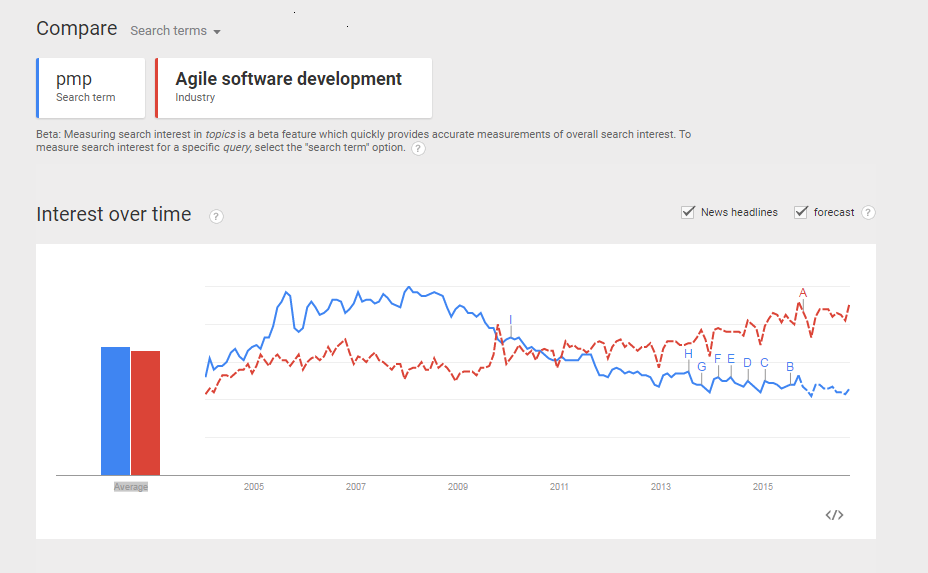
The PMP certification seems to have picked up and peaked and gradually slides down with the forecast trending upwards, while Agile at one stage seems to have spiked over PMP and continued to ascent, and the forecast too is favorable.
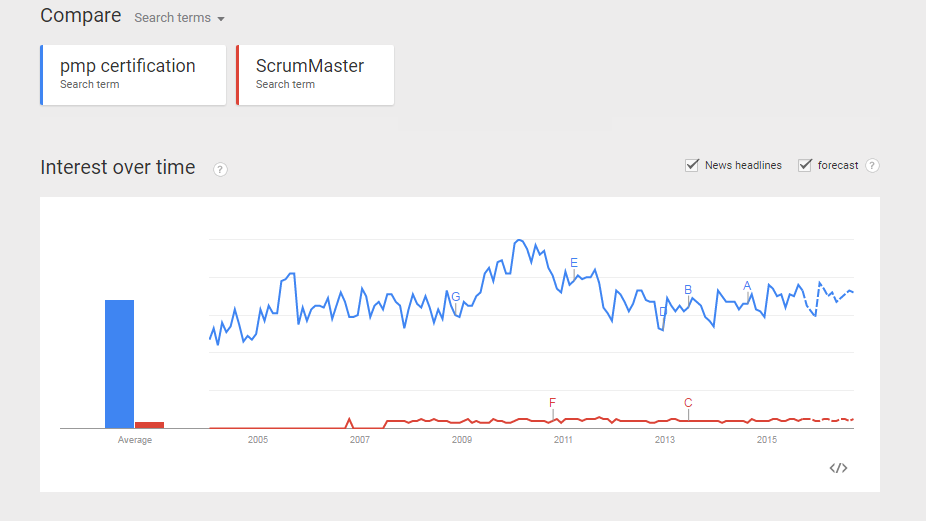
The certification aspect witnessed PMP on the rise and peaking only to slip down and forecast is forward, while Agile is steady with not much of growth nor stunted and the forecast is trending upwards.
The charts are based on ‘keyword’ search and need not necessarily endorse any claim not be evident of any outcome. Like stressed earlier they present a picture of the trends and such PMP is still quite popular, and Agile is holding on and growing.
So what do you think is the trend? Do let us know…
image courtesy: http://outmatch.com/top-trends-hr-get-agile-innovative-2017/
Read More
It’s an interesting pointer that can be deliberated but never decided with a Boolean yes/no response. Waterfall is the conventional methodology and given Agile’s merits it’s too attractive to make an immediate shift but one should reason with the ramification by balancing the pros and cons as agile may not be an ideal fitment for every project. Accepted Agile has made great strides but has it replaced waterfall altogether is subjective if we are mindful of the consequences. We learn by experience and the takeaway in the form of teaching is to beware and be cautious of concerns. Usually technical heads mull over the decision by studying requirements again and again to arrive at a conclusion.
They are both project management methodologies, and the applicability rest on many factors. Just because waterfall has been around for long doesn’t make it indispensable and agile emerging much later is the most happening either. That’s why approach adopted should be strictly on merits. It’s a no-brainer the discussion about this subject would entail into PMP or PRINCE2 certification.
Waterfall methodology is most easily identified with PMP certification program, while PRINCE2 follows Agile. Both these approaches are very different, hence the deliberation before deciding on picking the best suiting the needs.
Waterfall is a typical plan-build-test-deliver stage, where the final version is envisioned in the planning phase, rendering the requirement study and scope as very critical, and any change is addressed through change requirement, and the customer gets to have a feel at the UAT stage only, when all is done and set to go.
Agile is very modular, impleneted through scrum, wherein the client acts as one of the stakeholders and can know firsthand the output of a phase technically referred as ‘sprint’ and every requirement is detailed as a story card with scrummaster manning the post. The individual accountability is very high. The sprint demo can be shown to client for feedback and changes incorporated and hence its the process is iterative. This flexibility is not possible in waterfall methodology.
Let's study the popular or most searched words using Google Trends, and though it’s a ballpark and not a scientific proposition, it does offer a perspective as to where the world is heading towards on a bird’s view.

The PMP certification seems to have picked up and peaked and gradually slides down with the forecast trending upwards, while Agile at one stage seems to have spiked over PMP and continued to ascent, and the forecast too is favorable.

The certification aspect witnessed PMP on the rise and peaking only to slip down and forecast is forward, while Agile is steady with not much of growth nor stunted and the forecast is trending upwards.
The charts are based on ‘keyword’ search and need not necessarily endorse any claim not be evident of any outcome. Like stressed earlier they present a picture of the trends and such PMP is still quite popular, and Agile is holding on and growing.
So what do you think is the trend? Do let us know…
image courtesy: http://outmatch.com/top-trends-hr-get-agile-innovative-2017/
The Role of a Project Manager: Leading Projects to Success.
Who makes a good project manager? A technically sound, rich in experience with exceptional soft skills?
How much of a value-add is thrown-in with the ‘technical’ tag. End of the day its Management - be it technical or non-technical.
Management role is very dynamic wherein one should know where to reach and how to achieve the same. For anyone to be a successful Manager at senior level, build a team having right skill. It is important to note that empowering next-level managers decides the success of their Manager.
Of course, the Manager needs to have big picture and good clarity on the vision to give the right direction to the next- level. Manager should have right people to execute the same vision and position at the right place. But how does one identify ‘right’? Call it acumen or something gained from experience or inner calling or instincts – or sum of all. Subjective as ‘right’ might be, it does prove critical for the success of the Manager in any organization.
Know Self/Team:
Any Manager should assess and evaluate his/her strength and team’s strength as well. The clarity should be crystal clear for the Manager / team to achieve the mission/vision of the team.
Know the gap (Self/Team):
And it is imperative to know what the gap within the current team setup – be it technical, functional & behavioral.
Fill the Gap:
Gap can be filled in multiple ways depending on the scope and width of the gap. Managers always should try to work on people’s strength and enhance/sharpen to bring the best more out from his/her team. That will help the team to be engaged fully.
If the gap is on technical/functional aspect, team can undergo the required training if there is enough time for learning curve. When the need to address gap is critical or urgent, it’s better to hire people with right skills.
Find the ‘fitment’
When Manager decides to fill the gap by hiring new resources, the ability to assess about the new hire to deliver is a one of the key clincher. If not, nothing wrong in seeking the opinion of peers’ help to connect with the right fitment. It’s very important that we choose the right people for any opening as most of the cases it’s the fitment that’s diagnosed as the pain point – and that too late in the project.Screening and selecting suitable candidates who are sound technically can cut out most of the spillage and increase the turnaround time.
Technically sound professionals have an appreciable head-start as compared to the less informed as the learning curve isn’t that steeper and with a minimal time spent in training the crew can be inducted in the team and start contributing. They are ‘the professional with practice’.
We will discuss more about this topic in our next blog from the perspective of PMBOK® version 6.
image courtesy: www.pexels.com
Read More
Who makes a good project manager? A technically sound, rich in experience with exceptional soft skills?
How much of a value-add is thrown-in with the ‘technical’ tag. End of the day its Management - be it technical or non-technical.
Management role is very dynamic wherein one should know where to reach and how to achieve the same. For anyone to be a successful Manager at senior level, build a team having right skill. It is important to note that empowering next-level managers decides the success of their Manager.
Of course, the Manager needs to have big picture and good clarity on the vision to give the right direction to the next- level. Manager should have right people to execute the same vision and position at the right place. But how does one identify ‘right’? Call it acumen or something gained from experience or inner calling or instincts – or sum of all. Subjective as ‘right’ might be, it does prove critical for the success of the Manager in any organization.
Know Self/Team:
Any Manager should assess and evaluate his/her strength and team’s strength as well. The clarity should be crystal clear for the Manager / team to achieve the mission/vision of the team.
Know the gap (Self/Team):
And it is imperative to know what the gap within the current team setup – be it technical, functional & behavioral.
Fill the Gap:
Gap can be filled in multiple ways depending on the scope and width of the gap. Managers always should try to work on people’s strength and enhance/sharpen to bring the best more out from his/her team. That will help the team to be engaged fully.
If the gap is on technical/functional aspect, team can undergo the required training if there is enough time for learning curve. When the need to address gap is critical or urgent, it’s better to hire people with right skills.
Find the ‘fitment’
When Manager decides to fill the gap by hiring new resources, the ability to assess about the new hire to deliver is a one of the key clincher. If not, nothing wrong in seeking the opinion of peers’ help to connect with the right fitment. It’s very important that we choose the right people for any opening as most of the cases it’s the fitment that’s diagnosed as the pain point – and that too late in the project.Screening and selecting suitable candidates who are sound technically can cut out most of the spillage and increase the turnaround time.
Technically sound professionals have an appreciable head-start as compared to the less informed as the learning curve isn’t that steeper and with a minimal time spent in training the crew can be inducted in the team and start contributing. They are ‘the professional with practice’.
We will discuss more about this topic in our next blog from the perspective of PMBOK® version 6.
image courtesy: www.pexels.com
Professional Certification Emerges as the Key Benchmark
Professional certification is no more an alternative; it’s the benchmark. Professional certification is no longer restricted to a domain; its across business.
Professionals need certification today,
To be counted;
To stay competitive;
To possess intellectual capital;
To present credentials.
Be certified to expand career path.
Whatever be your chosen field, unless you excel and exceed expectations, your talent remain unharnessed. Certifications help you to amplify your skills and counts as key differentiator.
Topline is the Talent.
The HI-B visa creating a ruckus and protectionism playing it out in the front with full force. the parity in the pay that reckoned to be lopsided, the crunch now will be on the talent as the metric has been set for ‘indispensable expertise’. Still, there exists a gap between the available with the desirable. The numbers simply don’t add up to it.
The question is “are you resourceful?”
As one of the leading online education service provider, we regularly conduct boot camps, workshops and training mainly to equip the professionals/participants in enriching their knowledge base, and boost confidence level in order to become capable . The grind is difficult. Its talent alone that takes you to the top of the heap. Remember, there is no shortage of resume, it’s the skill that suffers a shortage. The demand-supply is always skewed and very rarely have we witnessed the demand surpassing the supply. More often, vacancies remain vacant for want of the talent.
image courtesy: goo.gl/icM3KX
Read More
Professional certification is no more an alternative; it’s the benchmark. Professional certification is no longer restricted to a domain; its across business.
Professionals need certification today,
To be counted;
To stay competitive;
To possess intellectual capital;
To present credentials.
Be certified to expand career path.
Whatever be your chosen field, unless you excel and exceed expectations, your talent remain unharnessed. Certifications help you to amplify your skills and counts as key differentiator.
Topline is the Talent.
The HI-B visa creating a ruckus and protectionism playing it out in the front with full force. the parity in the pay that reckoned to be lopsided, the crunch now will be on the talent as the metric has been set for ‘indispensable expertise’. Still, there exists a gap between the available with the desirable. The numbers simply don’t add up to it.
The question is “are you resourceful?”
As one of the leading online education service provider, we regularly conduct boot camps, workshops and training mainly to equip the professionals/participants in enriching their knowledge base, and boost confidence level in order to become capable . The grind is difficult. Its talent alone that takes you to the top of the heap. Remember, there is no shortage of resume, it’s the skill that suffers a shortage. The demand-supply is always skewed and very rarely have we witnessed the demand surpassing the supply. More often, vacancies remain vacant for want of the talent.
image courtesy: goo.gl/icM3KX
PMP® Certification Exam – Don’t Delay. Get Started Today.
Some of the professionals interviewed cited reasons that might sound unbelievable, but then that’s their version. We have listed some for your reference as a precautionary note not to delay or defer in taking up the exam. Every single day you lose is something lost forever. In case your mind is set in appearing for the exam and obstacles of any kind can appear as stumbling blocks, you still can overcome the odds and crack the exam.
Here are some reasons listed for pushing the date to ‘another day’:
“It’s too tough” - of course, it’s tough. PMP® actually moderates from average to tough and calls for dedicated study and determined efforts. The view from the top is terrific but you got to toil to get to the top.
“I AM BUSY. I don’t have time” – No one has the time to spare. Try checking with anyone and a volley of reasons backed with rationale will be thrown in return. MAKE TIME. You can always apportion time. You really don’t consume all the 24 hours. So late nights, early mornings, and of obviously, the weekend is all yours to prepare for PMP. We do find time to make ourselves available for occasions and get-together by freeing up bandwidth. Studies are a struggle since childhood and in adulthood with more responsibilities stooping the shoulder, and hence it’s no easy feat to sit and burn the midnight oil. ‘Nothing great was ever accomplished without making sacrifices.’
“The Job Pressure is too much” – agreed. We all have gone through the grind and it’s difficult to focus when your mind is constantly analysing multiple scenarios and multitasking. Despite the pressure, can you rise up to meet the challenge? Determination. When the traffic is too much, do you just reverse the vehicle and go back home or maneuver to find way to office? Most succeed because they are determined.
“May be next month” – the worst excuse. If something is to be done, better do it immediately. Tomorrow never comes, so how will next month? We only avoid accepting to spell the truth and instead pretend using the pretext of ‘another day’. As it is written, ‘If we wait until we are ready, we will be waiting for the rest of our lives’.
“I am not good enough” – that’s accepting defeat even before the fight. How would you know unless you attempted. So, all those appear for the PMP exam pass? There are no failures? Wrong. Even those failed should be applauded for their audacity to make an attempt, and failure will push them further to fare better. So long you qualify with the prerequisites set by PMI, you are as good as any applicant. Just that you are poor on confidence. Build self-confidence and go for it. You will emerge triumphant.
The reasons to slow you down or stop may be innumerable. Bear in mind that it’s the strong that survives and succeeds. SO DO IT NOW.
“Its not the mountains we conquer, but ourselves.” – Edmund Hillary
Read More
ITSM: Unlocking Value Beyond Just Service Management!!!
There is also a misconception that IT Systems pertains to the software industry. The perception should ‘wherever IT Systems are deployed’; it calls for managing and maintenance of IT Systems. Automation is again big time in the software industry. Check out and you will find them more IT-services based.
Who will manage the IT Services?
Of course, IT Service Management team, that could include IT System Managers, IT Administrators, System Administrators, IT Quality Specialists, IT Audit, IT System Analysts and Quality Control who are either responsible for streamlining the IT Systems or part of IT Service Management team, Quality Assurance teams responsible for software and infrastructure.
Who will manage the people handling IT Services?
IT is ubiquitous. It’s almost everywhere. So, IT Service management is indispensable because there is no sphere of our life which IT has not shaped up. So you need people who are skilled in managing and handling IT systems. The need for ITIL® Certifications is more as a test of competency and validation of expertise in handling critical scenarios.
Why ITIL® Certifications
IT Service setup can be simple or complicated, and more often not, the complexity varies in severity. Hence, most companies prefer skilled people with experience and rich expertise in entrusting the systems. Just like mirror servers, company don’t prefer to depend on any particular team, rather they prefer a mix of teams who can be deployed and pressed in to service should a situation arise. This is the very reason why the ITIL® Certifications have gained prominence in the recent times as professionals start at foundation level and then move on to the intermediate modules – which can be either lifecycle modules best suited for professional pursuing management of services and the other is capability modules, which is apt for professionals preferring the process, and the next level of certification is the MALC ( Managing Across the Lifecycle) and clearance will lead to ITIL Expert. So given the mix of management and process in the intermediate levels, companies also use a judicious mix of people capable of handling management or process related issues.
In case of any faulty issues or malfunction, the troubleshooting will be addressed by the maintenance crew who are always on standby. Expecting the unexpected is a good maxim and mostly followed by all the companies that have deployed IT Systems. Maintenance is a critical and crucial as managing project. The prerequisites, qualifications, certification and validation in terms of capability and competency remain the same.
image:http://www.web-techsupport.com/images/ourservices.jpg
Read More
Can I Apply for the PMP® Exam Without Project Manager Title
This is a very common question heard in the corridors treaded too often by the Information Technology professionals, while other verticals and domains are following suit. And the answer is: Yes, you can.
Enroll for Project Management Professional (PMP) with a reputed education provider to earn 35 Contact Hours which is mandatory as prerequisite for taking up the PMP exam. You must possess the major prerequisite in terms of education and experience: Secondary degree (High School) and 60 months spent leading and directing project tasks [or] Four-year degree(Bachelor's) with 36 months unique, non-overlapping professional project management experience leading and directing project tasks.
The 4-day program will enable you to become proficient with the Principles of Project Management, mainly the 47 project management processes and 10 knowledge areas – this will be the curriculum or syllabus. The trainer, at best, can take you through the topics by apportioning time required to spend on modules as careful analysis has defined the hours to be dedicated to a particular module and they greatly differ from one to another.
The basic training must be supplemented through self-study by diving deep into the 10 knowledge areas as detailed in ‘PMBOK Guide- A guide to the Project Management Body of Knowledge’ as key reference and the course materials provided by the education provider. It’s to be noted that PMBOK will be offered by the PMI (Project Management Institute). as part of your registration exam fees as a soft copy.
How the 4-day training can be taken is matter of choice and convenience, be it classroom or virtual classroom or e-Learning. End of the day, much depends about your competency and capability in cracking the PMP certification examination. So far the answer is academic. Now from a practical perspective, your performance in the final exam boils down to the preparation. The better prepared you are, best are chances of making it big at the first attempt. Every institution’s bet is to equip their participants to pass PMP, and this is the differentiator for iCertGlobal to be one of the most sought after destination in preparing for professional certification.
We offer, in addition to the well-planned and well-structured schedule classroom or LVC {Live Virtual Classroom] training, other notables that prove to be the key ingredients to our immense success and popularity:
Exemplary course materials prepared by Industry experts who are PMP certified with hands-on experience in project management and training. Hence they bring tremendous inputs in terms of experience and expertise in carving out the course related resources like Books, Quiz, Practice Questionnaire, Case Studies, and real-time scenario analysis.
Exam Simulator with more than 6000 questions. The questions are created in the same complexity as it would be in the final PMP exam. The pattern and population of questions drawn for various modules will be of the same density as expected in the PMP exam.
Refreshing sessions are for those, on request, to brush up the lessons already learnt to brace for the final race.
Participants are encouraged to stay in touch and maintain contact through the 24x7 support to enhance improved communication. They can create as many opportunities at every turn to learn in as many forms to sharpen the skills in gaining the edge. A repository of resources is available for online access anytime, more as a supplementary link.
Moreover, we follow-up with every participant to sense their progress understand and offer services wherever struggle is detected or discovered.
Of course, the growing testimonies speak for itself!!
image:https://www.freeimages.com/photo/my-tools-1239864
Read More
This is a very common question heard in the corridors treaded too often by the Information Technology professionals, while other verticals and domains are following suit. And the answer is: Yes, you can.
Enroll for Project Management Professional (PMP) with a reputed education provider to earn 35 Contact Hours which is mandatory as prerequisite for taking up the PMP exam. You must possess the major prerequisite in terms of education and experience: Secondary degree (High School) and 60 months spent leading and directing project tasks [or] Four-year degree(Bachelor's) with 36 months unique, non-overlapping professional project management experience leading and directing project tasks.
The 4-day program will enable you to become proficient with the Principles of Project Management, mainly the 47 project management processes and 10 knowledge areas – this will be the curriculum or syllabus. The trainer, at best, can take you through the topics by apportioning time required to spend on modules as careful analysis has defined the hours to be dedicated to a particular module and they greatly differ from one to another.
The basic training must be supplemented through self-study by diving deep into the 10 knowledge areas as detailed in ‘PMBOK Guide- A guide to the Project Management Body of Knowledge’ as key reference and the course materials provided by the education provider. It’s to be noted that PMBOK will be offered by the PMI (Project Management Institute). as part of your registration exam fees as a soft copy.
How the 4-day training can be taken is matter of choice and convenience, be it classroom or virtual classroom or e-Learning. End of the day, much depends about your competency and capability in cracking the PMP certification examination. So far the answer is academic. Now from a practical perspective, your performance in the final exam boils down to the preparation. The better prepared you are, best are chances of making it big at the first attempt. Every institution’s bet is to equip their participants to pass PMP, and this is the differentiator for iCertGlobal to be one of the most sought after destination in preparing for professional certification.
We offer, in addition to the well-planned and well-structured schedule classroom or LVC {Live Virtual Classroom] training, other notables that prove to be the key ingredients to our immense success and popularity:
Exemplary course materials prepared by Industry experts who are PMP certified with hands-on experience in project management and training. Hence they bring tremendous inputs in terms of experience and expertise in carving out the course related resources like Books, Quiz, Practice Questionnaire, Case Studies, and real-time scenario analysis.
Exam Simulator with more than 6000 questions. The questions are created in the same complexity as it would be in the final PMP exam. The pattern and population of questions drawn for various modules will be of the same density as expected in the PMP exam.
Refreshing sessions are for those, on request, to brush up the lessons already learnt to brace for the final race.
Participants are encouraged to stay in touch and maintain contact through the 24x7 support to enhance improved communication. They can create as many opportunities at every turn to learn in as many forms to sharpen the skills in gaining the edge. A repository of resources is available for online access anytime, more as a supplementary link.
Moreover, we follow-up with every participant to sense their progress understand and offer services wherever struggle is detected or discovered.
Of course, the growing testimonies speak for itself!!
image:https://www.freeimages.com/photo/my-tools-1239864
Understanding Stakeholder Management for Project Success.
The success of any project is attributed to the successful management of Stakeholders. If you don’t know all your stakeholders, that implicitly states an inherent risk already in your project. For every aspect of the project, identify the key stakeholder(s).
Stakeholder Management
Stakeholder Management is vital part of Project Management. Communicate the right things at the right time which will make the stakeholders in line with progress made in the Project. Last minute surprises are the least expected and any delay that’s visible should be informed well ahead. The worst would be an irate customer who might become bellicose. Good news can be deferred but bad news should never be delayed.
Clear communication with respective stakeholder(s) about their role in the project in terms of expectation – the expected and what’s expected of them - will provide clarity on their stake. Fair to set the right expectation – don’t go overboard or unrealistic. It’s far better to buy time than fall behind schedule.’
By managing the stakeholders throughout the project life cycle, ensure that risks are managed well. Some of the risks can be mitigated through effective stakeholder Management
How do you do Manage Stakeholder?
Normally 90% of the stakeholder Management can be done with proper communication. By Proper Communication, we lay open the door and become transparent to earn the trust. So long there is nothing to hide, then nothing to fear about backlashes. More often considerate clients offer counseling and even settle for trade-off in the good faith that goods delivery will happen with some delay.
Another important aspect of Stakeholder Management is to handle/address key stakeholder expectations formally in the projects. What do we mean Key Stakeholder? People who have authority to change the Project Scope, Cost or Schedule or who can influence in any of these three are considered as Key Stakeholders and they need to be consulted for every change in Scope, Schedule or Cost.
Engage your Stakeholders
Another important aspect of Stake holder Management is to engage them throughout the project life cycle. If we fail to engage them, then they may get disconnected from the project and it will turn out to be a risk at a later point in time. Communication is significant but that is not sufficient for the successful stakeholder Management. Engaging the stakeholders is considered as Successful Stakeholder Management.
How do you engage your Stakeholder?
• Involve the Stakeholders in all the decision making
• Get periodical feedback or review from key Stakeholders
• Incorporate the actions items into the project plan with the required changes recorded and necessary approvals from the concerned stakeholders.
• Get their wish list/and future expectations and add it in backlog
• Anticipate their expectation and get concurrence for due incorporation
For more information about Stakeholder Management, visit us at http://goo.gl/4s0KuY and get to know about Project Management certification programs.
Read More
How do you engage your Stakeholder?
Advance Your Career with PRINCE2® Certification Today!!
We have moved past the times when experience was enough for an audience with the HR, if not an offer.
Present times have a different kind of poser. Experience needs to be backed up with a certification. There isn't much of a choice. Credential is a key differentiator. This paper will discuss the prospects of PRINCE2® shaping up your profile as that consummate project management professional.
PRINCE2® is a major prerequisite for Project Management
In UK, PRINCE2® (Projects in Controlled Environments) is considered de facto standard for IT project management. PRINCE2 doesn’t define project as temporary endeavor, rather as a project management method it delivers based on a business case. The progress of the project is measured and monitored through periodical review of the business case so as not to deviate from the business outcome, and thus the situation at the ground level is assessed and addressed with a greater control and clarity. PRINCE2 can be used for any kind of project cutting across culture and setting aside geographic barriers. It is an effective process method, also easy to learn and the ease of use of framework makes it more favorable with newcomers to PRINCE2®. The merits of PRINCE2® are phenomenal that more companies consider as a major requisite in shortlisting and selection process.
PRINCE2® helps the Managing Project Management
In PRINCE2 methodology, the decision making doesn’t rest with the project manager, rather the functional and financial authority is with the senior executive. The project manager will help in managing and administering he project by directing resources on behalf of the board and primarily the reason why government sector prefer this program due to its standardized approach.
PRINCE2® improves employment opportunities.
The mind has never been at such a premium and to those talented, corporate are just waiting to tap to make it a win-win. . It’s very mutual. But how does PRINCE2 can turn out to be an asset? Its world class and widely renowned and increasing number want to be certified, especially the PRINCE2 Practitioner. You can go global for opportunities and show you got it what it takes with your PRINCE2 credential. Just check the stats at the top which is a clear indicator in the surge for the demand for qualified and PRINCE2® certified project managers.
You can reach us at info@icertglobal to know more PRINCE2® certification program.
image courtesy: goo.gl/41ogs
Read More
We have moved past the times when experience was enough for an audience with the HR, if not an offer.
Present times have a different kind of poser. Experience needs to be backed up with a certification. There isn't much of a choice. Credential is a key differentiator. This paper will discuss the prospects of PRINCE2® shaping up your profile as that consummate project management professional.
PRINCE2® is a major prerequisite for Project Management
In UK, PRINCE2® (Projects in Controlled Environments) is considered de facto standard for IT project management. PRINCE2 doesn’t define project as temporary endeavor, rather as a project management method it delivers based on a business case. The progress of the project is measured and monitored through periodical review of the business case so as not to deviate from the business outcome, and thus the situation at the ground level is assessed and addressed with a greater control and clarity. PRINCE2 can be used for any kind of project cutting across culture and setting aside geographic barriers. It is an effective process method, also easy to learn and the ease of use of framework makes it more favorable with newcomers to PRINCE2®. The merits of PRINCE2® are phenomenal that more companies consider as a major requisite in shortlisting and selection process.
PRINCE2® helps the Managing Project Management
In PRINCE2 methodology, the decision making doesn’t rest with the project manager, rather the functional and financial authority is with the senior executive. The project manager will help in managing and administering he project by directing resources on behalf of the board and primarily the reason why government sector prefer this program due to its standardized approach.
PRINCE2® improves employment opportunities.
The mind has never been at such a premium and to those talented, corporate are just waiting to tap to make it a win-win. . It’s very mutual. But how does PRINCE2 can turn out to be an asset? Its world class and widely renowned and increasing number want to be certified, especially the PRINCE2 Practitioner. You can go global for opportunities and show you got it what it takes with your PRINCE2 credential. Just check the stats at the top which is a clear indicator in the surge for the demand for qualified and PRINCE2® certified project managers.
You can reach us at info@icertglobal to know more PRINCE2® certification program.
image courtesy: goo.gl/41ogs
What's New in the PMBOK® Guide – Sixth Edition? Find Out!
Project management as a discipline is evolving, and so is PMP® exam. PMBOK® is changing its version, from PMBOK® fifth to Sixth edition. Some of the leading lights in project management and active practitioners from around the world underscored the need to introduce agile approach based on research carried out by PMI. This led to the release of PMBOK® Sixth edition last September 2017, ensuring PMP® certification stays relevant to the changing trends of present times.
For the first time, implementation in agile environment is included in PMBOK® Guide – Sixth Edition. This is an important announcement weighed in the context of how waterfall and agile approaches can be bridged. As a result PMBOK® is aligned with Agile Practice Guide. PMI partnered with Agile Alliance® for developing the Agile Practice Guide.
So, will this impact the PMP® certification exam? When will the PMBOK® Guide – Sixth Edition be released? When will the PMP® Exam change in 2018?
For the uninitiated, please be informed that PMBOK® Guide – Sixth Edition was released on 6th September, 2017, and books are available in different formats. If you are a PMI member, please visit the website and download relevant study materials in pdf format.
PMP® Exam will change on 26 March, 2018. Candidates who take up the exam before 25th March, 2018, the exam reference material will be PMBOK® Guide – Fifth Edition. And, for those who take the exam on or after 26 March, 2018, the exam reference material will be PMBOK® Guide – Sixth Edition. Kindly note that that the PMP® certification exam is not solely based on PMBOK® Guide. It is one of the key reference materials to prepare for the exam.
You might want to know what are the other changes in PMBOK® Guide – Sixth Edition?
The role of Project Manager is studied more prominently. A dedicated chapter deals Project Manager focusing on leaderships, skills, competency, and experience in effectively leading and managing a project.
.
There will be 49 processes. 3 new processes have been added and one deleted. The newly inducted processes are:
• "Manage Project Knowledge"
• "Control Resources"
• "Implement Risk Responses"
Close Procurements process has been removed.
Two Knowledge Areas have been renamed.
• Time Management is renamed as Schedule Management
• Human Resource Management is renamed as Resource Management
The Knowledge Area will feature four sections, namely,
• Key Concepts
• Trends and Emerging Practices
• Tailoring Considerations
• Considerations for Agile/Adaptive Environments
Other additions include:
• Trends and emerging practices
• Tailoring considerations
• A greater emphasis on Strategic and Business Knowledge
Read More
Balance Work and Life Time Management: Unlock Success Now.
There seems to be early burn-out in IT professionals.
Job pressure, peer pressure, management pressure – the stress is too much ‘burning the midnight oil’ used to be cited ion critical context. Today, it has become the order of the day. Procrastination or poor time management is the primary reason.
Working long hours isn’t productivity. In fact, it is to the contrary. Freeing up bandwidth to take up additional tasks makes a professional resourceful reflective of commitment and management.
Devotion to work should be willful otherwise its leaves one dissatisfied and disgruntled. Everything ought to be balanced – including work.
If you can’t get the work done in the given time, either the estimation is incorrect or the resource incompetent.’ People do tend to procrastinate.
The 40 hour week
Any project manager with appreciable knowledge and experience will not estimate more than 8-hours in a day. Remember time is money and hence any inflation in your estimation will have an adverse implication on your cost estimation. So balancing the 40-hour and keeping the project within cost calls for a skilled and smart time management.
Performance and productivity
No matter how many hours you clock, its 4 hours spread across 8. The body might be willing but the mind simply is not up to it. Exhaustion, fatigue leads to failure. Your ability to concentrate ebb s with passage of time. Sources from public domain cite that working fewer hours increase productivity and thereafter tend to wane.
Work-life balance
“I am too busy at work” is the usual refrain. You start before the kids awake and return after the fast asleep. Many professionals itinerary falls in to this pattern. Genuine cases of work chewing and even gobbling time is a possibility but that can’t become the norm. Its not family first or work at any cost. One has to strike a balance to do justice to both – stakeholder management. And its important to attend on everyone, and if possible content.
Work-life balance is not pitting work against family, as it is usually misunderstood. Work-life balance is giving your 100% wherever you are occupied – with family or work.
image courtesy: goo.gl/8KkLyP
Read More
There seems to be early burn-out in IT professionals.
Job pressure, peer pressure, management pressure – the stress is too much ‘burning the midnight oil’ used to be cited ion critical context. Today, it has become the order of the day. Procrastination or poor time management is the primary reason.
Working long hours isn’t productivity. In fact, it is to the contrary. Freeing up bandwidth to take up additional tasks makes a professional resourceful reflective of commitment and management.
Devotion to work should be willful otherwise its leaves one dissatisfied and disgruntled. Everything ought to be balanced – including work.
If you can’t get the work done in the given time, either the estimation is incorrect or the resource incompetent.’ People do tend to procrastinate.
The 40 hour week
Any project manager with appreciable knowledge and experience will not estimate more than 8-hours in a day. Remember time is money and hence any inflation in your estimation will have an adverse implication on your cost estimation. So balancing the 40-hour and keeping the project within cost calls for a skilled and smart time management.
Performance and productivity
No matter how many hours you clock, its 4 hours spread across 8. The body might be willing but the mind simply is not up to it. Exhaustion, fatigue leads to failure. Your ability to concentrate ebb s with passage of time. Sources from public domain cite that working fewer hours increase productivity and thereafter tend to wane.
Work-life balance
“I am too busy at work” is the usual refrain. You start before the kids awake and return after the fast asleep. Many professionals itinerary falls in to this pattern. Genuine cases of work chewing and even gobbling time is a possibility but that can’t become the norm. Its not family first or work at any cost. One has to strike a balance to do justice to both – stakeholder management. And its important to attend on everyone, and if possible content.
Work-life balance is not pitting work against family, as it is usually misunderstood. Work-life balance is giving your 100% wherever you are occupied – with family or work.
image courtesy: goo.gl/8KkLyP
2018 – Yours to believe, blossom, conquer and make it happen
When the clock chimed 12, and crackers burst open ushering the new year , greetings galore and goodies strewn around, it was a moment to reflect about the past and look right ahead with renewed hope. How did we fare and what’s the forecast for 2018? This probably is deliberation of many a minds both from a personal and professional perspective. 2017 witnessed some great happenings which will make a geek beam with pride – gadgets, gizmos, apps and what not. The World observed with heightened expectation the numerous startups, the growing number of entrepreneurs, the tectonic shift in technology that makes the ground beneath the feet shake: ‘happening today, history tomorrow’ proved so plausible. And in all these, the overriding factor and dire demand proved to be the digital presence and exceptional soft skills. Just as we are increasingly online and extremely mobile, the medium and means have changed dramatically.
As much as technology is becoming the key differentiator, technologists are the game-changers. Brick and mortar gave way to online offerings and our niche product offerings to professionals saw a surge in Live Virtual Class and e-Learning. The corporate accounts in our clientele upsurged in number. In all it was a successful year, having posted results close to the projections. So the ride was bumpy sometimes and smooth as well.
Farewell 2017.
The road ahead is full of opportunities if one knows how to count and capitalize. There is going to be exciting and engaging times ahead. ‘Education never ends’ – it’s for a lifetime. Knowledge is the key and Technology-enabled services will be the touchstone.
There is indeed a growing gap – from both the employers and employees standpoint. The fitment is really a hard-find. Hence, grooming the greatest asset – human capital – is the critical need as exponential growth in technological developments makes it a mandate to embrace existing and emerging technologies.
We will have to rejig our offering by stacking with latest technologies that was announced yesterday or this morning and impart with a conviction that we communicated the message across. Training cant be 'touch and go'. It is telling by the performance of the participants long after they have completed their course. So, their success is our saving grace. The focus will be on serving a new age courses that will enable developing new skillset to compete in the market and tap opportunities successfully. The spotlight will be mainly on cloud, Big data, Artificial Intelligence, Cyber Security, Automation, and Social, Mobile, Analytics, and Cloud (SMAC).
2018 – is ours to make it big. Let us get ahead.
image courtesy: goo.gl/9Gu1GA
Read More
Reskill to Get Ready: Empower your future with new skills
When automation posed solid threat to ‘manpower utilization’ endangering jobs, the concern was to stay reliant in rising up and above the order of the day. Present times prove to be even more critical often confronting competencies, by checking “are you relevant to the changing times by reskilling”. It is this alignment that is becoming worrisome. From neutralizing the threat from robots to our career, times have changed when we need to think about managing the robots alongside with human resources.
Robots were introduced to solve complex industry challenges. The reach of robots slowly extended freeing up human resources to be reassigned. It also removed them from service. Robots were associated with niche technologies. Unemployment as a result of automation disrupted lives and livelihood. Softskills and augmented AI took over. The road ahead is full of opportunities if one knows how to count and capitalize. Knowledge is the key. Technology enables. The barrier begins to blur. Reskilling is required for the transition with the existing and emerging technologies.
Reskill or get replaced.
Talent acquisition checks on core competencies.
“robobosses” will increasingly make workplace decisions that previously could only have been made by human managers.
-https://www.gartner.com/smarterwithgartner/could-your-next-boss-be-a-robot/
Robots could become your boss. Are you ready? In a world where machines and AI will reign, the smartest move is to recalibrate. Upskill is to anticipate and accommodate by shifting gears and changing lanes. The preparedness will reflect on performance. Machines means measurement. Will machine power eliminate manpower? Not everything. At the same time, retainer on certain jobs have to be relinquished.
One of the way to reskill: Stay focused on soft skills.
The landscape will soon change. What holds good today may not be required or relevant. Stay abreast with changes. Expand knowledge base by studying the trends. For instance, Gartner in its study revealed “six billion connected things will be requesting support.”
Training with educational institutions and partner progams in skill development who offer flexible learning methods will help realigning in in personal goal and organizational objectives.
image courtesy: http://enterarena.blogspot.in/2010/08/on-your-mark-get-ready-go.html
Read More
Agile Complements Waterfall in Project Management Methods
One of the major inclusions in the release of the recent PMI-PMP Sixth edition is Agile.
Agile doesn’t trade places with traditional project management which is centered on water-fall methodology. Hence Agile doesn’t counter against PMI®, long known for its project management credentials through PMP®, rather it complements… Let’s get the insight on why do we recommend Agile. It is to be noted that PMI features PMI-ACP® as one of its flagship certification which is fast gaining grounds, if the traction is any indicator.
Cost/Schedule Creep…
Agile talks about how we can be adaptive for changes for the projects which doesn’t have clear scope or which has evolving scope. However Agile doesn’t address about how one should manage the cost/effort against the change and in nutshell Agile talks/encourages the changes of the scope, Cost, effort and in reality as the project runs based on the budget and cost in most cases. Agile can complement within the schedule/cost however there needs a cap for the cost and schedule to avoid the major creeps on the same. PMI standards protect the projects from these variances or it gives us the better predictability on the same.
Big Picture Vs Progressive evolution
One should have big picture in mind which is very important to achieve the final goal. While agile emphasize on changes and adaptations, it doesn’t define the boundary wherein PMI plays a key role . We can be adaptive to changes as long as it is within the final goal of big picture. Without having final frame in mind, one cannot evolve in the right direction which means PMI gives you the right direction to evolve rightly. Without high level plan in hand, running the project in agile may never predict any time. We need a high level plan to assess ourselves on where do we stand in terms of goal achievements.
Agility within the project (Scope, Cost & Schedule) is always recommendable so that we always have grip on the project. Project should aim for success and that success is defined based on Scope achievement within agreed time and cost factors.
Read More
The Sixth Edition of PMBOK: Redefining Project Management
PMI (Project Management Institute) was expected to roll out the Project Management Body of Knowledge (PMBOK® Guide) – Sixth Edition by the third quarter of 2017. AND IT IS OUT.
What are the changes in the Sixth Edition?
>> Approaches to Agile.
Every knowledge area will be inclusive of approaches to Agile, Iterative and Adaptive Environments’. This section will detail the integration of agile practices in project backgrounds.
>> PMI Talent Triangle™.
PMI spells the details about the technical skills, business intelligence, and leadership considered the key skills for success. It is also known as Talent triangle.
>> The size of the book.
The fifth edition PMBOK® Guide, has 13 chapters that spans 415 pages. The sixth edition is expected to be quarter the size of the 5th edition, which means it should be close to 84 pages and the number of chapters too have come down to 10. So, sixth edition should be 10 chapters with 84 pages in the draft version.
>> Inputs, Tools & Techniques, Outputs (ITTOs).
The sixth edition will not dwell deep into ITTOs, rather it will be covered at a high level.
>> Alignment with Process Groups.
The sixth edition will be divided based on the 5 process groups, and not the 10 knowledge areas. This is considered as a major change. The Role Delineation Study (RDS) conducted by PMI has presented its findings and proposed the changed to be aligned with process groups.
>> Combination of first three chapters.
In the sixth edition, the first three chapters combined as one – the interpersonal skills of the project manager and organizational skills will be merged in to one.
>>Two processes are expected to be deleted.
The Close Procurement process and Estimate Activities Resources are more likely to be deleted.
>>Two knowledge areas to be renamed.
Time Management and Human Resource Management to be renamed. Time management will be renamed Schedule management, while Human Resource Management becomes Resource Management.
>> Knowledge Areas to feature four section.
Every knowledge areas will have four new sections, namely, Key Concepts, Trends and Emerging Practices, Tailoring Considerations and Considerations for Agile/Adaptive Environments.
>> An exclusive chapter on role of Project Manager.
This chapter on Project Manager will cover the key concepts about core competencies, expertise, leadership skills expected in leading a project.
Reference source: http://www.examspm.com/2016/07/16/pmbok-6th-edition-release-date-changes/
https://www.pmi.org/pmbok-guide-standards/about/current-projects
http://www.pmi.org/certifications/types/project-management-pmp/update
https://www.pmi.org/pmbok-guide-standards/foundational-standards-exposure-draft
https://www.pmi.org/learning/training-development/talent-triangle
image courtesy: https://www.pmi.org/pmbok-guide-standards
Read More
PMI (Project Management Institute) was expected to roll out the Project Management Body of Knowledge (PMBOK® Guide) – Sixth Edition by the third quarter of 2017. AND IT IS OUT.
What are the changes in the Sixth Edition?
>> Approaches to Agile.
Every knowledge area will be inclusive of approaches to Agile, Iterative and Adaptive Environments’. This section will detail the integration of agile practices in project backgrounds.
>> PMI Talent Triangle™.
PMI spells the details about the technical skills, business intelligence, and leadership considered the key skills for success. It is also known as Talent triangle.
>> The size of the book.
The fifth edition PMBOK® Guide, has 13 chapters that spans 415 pages. The sixth edition is expected to be quarter the size of the 5th edition, which means it should be close to 84 pages and the number of chapters too have come down to 10. So, sixth edition should be 10 chapters with 84 pages in the draft version.
>> Inputs, Tools & Techniques, Outputs (ITTOs).
The sixth edition will not dwell deep into ITTOs, rather it will be covered at a high level.
>> Alignment with Process Groups.
The sixth edition will be divided based on the 5 process groups, and not the 10 knowledge areas. This is considered as a major change. The Role Delineation Study (RDS) conducted by PMI has presented its findings and proposed the changed to be aligned with process groups.
>> Combination of first three chapters.
In the sixth edition, the first three chapters combined as one – the interpersonal skills of the project manager and organizational skills will be merged in to one.
>>Two processes are expected to be deleted.
The Close Procurement process and Estimate Activities Resources are more likely to be deleted.
>>Two knowledge areas to be renamed.
Time Management and Human Resource Management to be renamed. Time management will be renamed Schedule management, while Human Resource Management becomes Resource Management.
>> Knowledge Areas to feature four section.
Every knowledge areas will have four new sections, namely, Key Concepts, Trends and Emerging Practices, Tailoring Considerations and Considerations for Agile/Adaptive Environments.
>> An exclusive chapter on role of Project Manager.
This chapter on Project Manager will cover the key concepts about core competencies, expertise, leadership skills expected in leading a project.
Reference source: http://www.examspm.com/2016/07/16/pmbok-6th-edition-release-date-changes/
https://www.pmi.org/pmbok-guide-standards/about/current-projects
http://www.pmi.org/certifications/types/project-management-pmp/update
https://www.pmi.org/pmbok-guide-standards/foundational-standards-exposure-draft
https://www.pmi.org/learning/training-development/talent-triangle
image courtesy: https://www.pmi.org/pmbok-guide-standards
eLearning Opens New Doors to Boundless Growth and Success
First, it’s an efficient educational system, and inexpensive as well.
It’s self-driven and hence the sense of admission and accountability is all-time high.
It’s not bound by anything – be it place or time. So you can do-it-yourself anytime, anywhere.
The freedom is unrestrained and unhinged. You are absolutely free in apportioning your time according to your convenience. The same is applicable for both the employers and employees.
Many are well-acquainted with e-Learning, and the positive highlights. The rapid rise in technology removes any hassles with regard to the reach. Access is not the issue. It’s the approach. Just because it can be accessed anytime, there is a tendency to procrastinate. Since there is no one to monitor, complacency creeps in making one lethargic and even lazy and listless. We expect self-discipline, and regretfully, the instances of utter disregard to discipline are just incredible.
So, what makes e-Learning as an important tool for learning and development?
Transform your training
Think Technology, think mobile. Empowering your employees in enriching their education in the way forward would be, naturally, mobile. You can choose your training modules and create it in an interesting and engaging manner to make the learner more involved and absorbed. It increases the attention span and greatly improves retention. The present and the future belong to mobile. Highly advanced companies, as much as 18% of all training is now delivered through mobile devices’.
Close the gap
It is often the case of ‘learn what we want you study’ without much emphasis on the content and packaging. Learners prefer a more personalized content that’s relevant and fast paced. Instead they are made to study subjects that best befits classroom setup. So there clearly exists a gap – that needs to be closed. E-Learning will help you in customizing to the crowd, and also identify and individual needs. That’s the flexibility made possible – kind of custom made or made to order. Its basically “to get them on your side”. And for that ‘you need to see their side.’
Promote a strong learning culture
For a company to report growth, it is imperative to nurture talent and promote a platform for knowledge acquisition and upgrade. Companies need to look beyond the conventional classroom and look for means that can effectively leverage technology in advancing the workforce skills. E-Learning should be viewed as complementing knowledge and development.
Technology is the trump card, and you play smart to emerge triumphant.
image source: goo.gl/F5p84X
Read More
Addressing the Trust Deficit in Today's Digital World!!
The word is abuzz about funds being embezzle or malpractice within company. Recent news about trade secrets and IP violations are doing the rounds and ties that were painstakingly built appears so fragile. In the past days a CEO has stepped down, misuse of money in a blue chip company, and non-conformance spells disaster in the parlance of people management.
Governance by every company is based on strong ethics and values and yet incidents like these rocks the boats sending shivers down the spine. Many exclaimed in disbelief ‘It’s just not possible”, and yet that’s exactly what happened – trust deficit.
It’s in good faith and belief that something is entrusted, but when the person manning the gate gives up blowing the cover than it’s a classic case of the ‘cats guarding the chickens.” Stakeholder Management is proving to be more critical. It’s not the company or the whole crew or the entire block that bungled, but just one rotten apple that makes the basket stink. And despite the foolproof security measures in places, failure like the incidents can not only be frustrating but erode the confidence misplacing the faith. The murky matters cast a long shadow sparing none from suspicion. Paradoxically, the benefit of doubt cannot be passed and things have worsened to a state where one has to prove innocence. So where went the ‘you are innocent unless proven guilty’. We live in different times that demands drastic changes and impose difficult compliances lest we face dire consequences.
What makes one misbehave? That’s a marked departure to their known traits and character – chances, circumstances, companionship, influence, ir plainly greed. No matter what might be the motives, the shatters everything that individual stood for and along with brings down the whole house. Hence, it becomes critical that we pay more attention to our human assets by studying behavioral aspects and identify scope for improvement. Not everyone is strong; some are susceptible. It’s up to the management to identify the grey areas and iron out the weakness. A SWOT generally helps – especially from an ethical standpoint.
We will like to hear your thought about this subject. Please do share and we welcome your inputs.
Read More
The word is abuzz about funds being embezzle or malpractice within company. Recent news about trade secrets and IP violations are doing the rounds and ties that were painstakingly built appears so fragile. In the past days a CEO has stepped down, misuse of money in a blue chip company, and non-conformance spells disaster in the parlance of people management.
Governance by every company is based on strong ethics and values and yet incidents like these rocks the boats sending shivers down the spine. Many exclaimed in disbelief ‘It’s just not possible”, and yet that’s exactly what happened – trust deficit.
It’s in good faith and belief that something is entrusted, but when the person manning the gate gives up blowing the cover than it’s a classic case of the ‘cats guarding the chickens.” Stakeholder Management is proving to be more critical. It’s not the company or the whole crew or the entire block that bungled, but just one rotten apple that makes the basket stink. And despite the foolproof security measures in places, failure like the incidents can not only be frustrating but erode the confidence misplacing the faith. The murky matters cast a long shadow sparing none from suspicion. Paradoxically, the benefit of doubt cannot be passed and things have worsened to a state where one has to prove innocence. So where went the ‘you are innocent unless proven guilty’. We live in different times that demands drastic changes and impose difficult compliances lest we face dire consequences.
What makes one misbehave? That’s a marked departure to their known traits and character – chances, circumstances, companionship, influence, ir plainly greed. No matter what might be the motives, the shatters everything that individual stood for and along with brings down the whole house. Hence, it becomes critical that we pay more attention to our human assets by studying behavioral aspects and identify scope for improvement. Not everyone is strong; some are susceptible. It’s up to the management to identify the grey areas and iron out the weakness. A SWOT generally helps – especially from an ethical standpoint.
We will like to hear your thought about this subject. Please do share and we welcome your inputs.
ITIL® – Define IT success through effective service strategy
A gaze into the future. That sounds exciting in terms of prospects and expectation. We seem to be advancing at an incredible speed. Technology is spearheading and impacting our lives in ways we would have imagined. According to Gartner’s prediction for 2016, some interesting insights that probably upped the ante would be
• By 2018, 6 billion connected things will be requesting support.
• In Gartner's IoT forecast, by 2020, more than 35 billion things will be connected to the Internet
• by 2021, 1 million IoT devices will be purchased and installed every single hour.
Of course, we expect smartness not just from people but in the products made by the people. When a solution is proposed, we pay attention and give equal weightage to the service aspect as well. Going by the statistics presented, there is going to an increased dependence on human intervention.
The stress on system and humans is significant to assess the way things will turnaround tomorrow. And that suggests the need of qualified professionals in ITSM. If the numbers in the forecasts are mind boggling, think about the demand that will be generated as a result and in terms of readiness what it takes to be prepared to face the challenges ahead. Looking forward, specialization and skills in service management will prove crucial and critical.
The advice to aspirants, especially those engaged in handling and managing of IT systems is to step out of the comfort zone and step up their credentials, wherein training and certification will establish credibility. ITIL and COBIT come across as commendable certification that should bolster your candidature. The digital divide is blurred and soon the switch to digital is expected to be complete attributing to the spike in the number presented.
By 2018, 2 million employees will be required to wear health and fitness tracking devices as a condition of employment.’ From a service perspective, for the system to be up and running, downtime is just unthinkable and SLAs charted will determine the uptime expected, which should be '200%'. So where are we heading? And how are we placed should the prediction come true? It might be baffling but to disbelieve would be disastrous.
It’s a clear indicator that systems would go up and so will the coordination to streamline. IT Services would hold a prominent portfolio. And if you are service personnel, its time to roll up your sleeves and start preparing to face tomorrow.
image courtesy: goo.gl/YX82HX
Read More
Effective Communication: Clear, purposeful, and impactful.
All us will agree to the need for greater clarity in communication – be it any form, verbal, or written.
A sales person to software analyst - communication is critical and crucial.
Despite a set agenda, meetings, at times, drag for hours not deliberating the issues tabled. When a stray thought entertained finds resonance with someone seated and soon the discussion veers off in a direction that’s tangential. When the meeting is concluded, everyone leaves learning a lesson not to get distracted but fall into the same trap that was supposed to be safeguarded.
Likewise, a client call to collect requirements goes nowhere because of the lack of connectivity. The stakeholders are not in the same page for the lack of understanding. It’s as if the conversation is taking place in a foreign tongue that the attendees in the call are absolutely clueless.
Or, the instance when a simple mail intended to communicate a message can be so misleading.
You don’t have to be poetic. Just be precise.
There is no need to compose an essay. A 2-liner will be enough if the message can be conveyed.
Be verbal, not verbose. Compose crisp concise message that usually are shorter sentences. Rather, simplify. Make it easier for the reader to understand. It should not be a test on IQ. Is your message universally understandable? Clarity means simplicity. We often confuse that word as a business jargon. The challenge of a learned mind is to communicate to a third-grade kid or a professor with absolute clarity. There should not be any confusion at all; nor the need to refer the dictionary. Prose that is polished, professional and stay simple, correct in its context brings out greater clarity in communication.
It can be challenging. So is communication.
image courtesy: goo.gl/QEqJ5Q
Read More
Enhance Your Career with PRINCE2® Certification for Success
The market is flooded with jobseekers yet headhunters are flummoxed with the failure to find the right fitment. The case is no different with Project Managers. We have moved past the times when experience was enough for an audience with the HR, if not an offer. A veteran armed with 20 years of experience is pitted against someone who is at the start of professional leg with 5 years under the belt. It isn’t fair-play? Well, the rules of the game have changed. Experience should have to be backed up with a certification. Take it or leave it. You cannot wallow in self-pity with “I have so many years to my credit.” Fine, show the credential. The most popular project management certifications are PMP®, PRINCE2®. This paper will discuss the prospects of PRINCE2® shaping up your profile as that consummate project management professional.
PRINCE2® is a major prerequisite for Project Management
In UK, PRINCE2® (Projects in Controlled Environments) is considered de facto standard for IT project management. PRINCE2 doesn’t define project as temporary endeavor, rather as a project management method it delivers based on a business case. The progress of the project is measured and monitored through periodical review of the business case so as not to deviate from the business outcome, and thus the situation at the ground level is assessed and addressed with a greater control and clarity. PRINCE2 can be used for any kind of project cutting across culture and setting aside geographic barriers. It is an effective process method, also easy to learn and the ease of use of framework makes it more favorable with newcomers to PRINCE2®
PRINCE2® helps the Board oversee Project Management
In PRINCE2 methodology, the decision making doesn’t rest with the project manager, rather the functional and financial authority is with the senior executive. The project manager will help in managing and administering he project by directing resources on behalf of the board and primarily the reason why government sector prefer this program due to its standardized approach.
PRINCE2® improves employment opportunities.
The mind has never been at such a premium and to those talented, corporate are just waiting to tap to make it a win-win. . It’s very mutual. But how does PRINCE2 can turn out to be an asset? Its world class and widely renowned and increasing number want to be certified, especially the PRINCE2 Practitioner. You can go global for opportunities and show you got it what it takes with your PRINCE2 credential. Just check the stats at the top which is a clear indicator in the surge for the demand for qualified and PRINCE2® certified project managers.
image courtesy: goo.gl/wbvjcX
Read More
Helping You Succeed in the PMP® Exam with Expert Guidance
Enroll for Project Management Professional (PMP®) with a reputed education provider to earn 35 Contact Hours which is mandatory as prerequisite for taking up the PMP® exam. The 4-day program will enable you to become proficient with the Principles of Project Management, mainly the 47 project management processes and 10 knowledge areas – this will be the curriculum or syllabus. The trainer, at best, can take you through the topics by apportioning time required to spend on modules. careful analysis has defined the hours to be dedicated to a particular module, which greatly differ from one to other.
The basic training must be supplemented through self-study by diving deep into the 10 knowledge areas as detailed in ‘PMBOK Guide- A guide to the Project Management Body of Knowledge’ as key reference, and the course materials provided by the education provider.
The 4-day training is matter of choice and convenience, be it classroom or virtual classroom or e-Learning. End of the day, much depends about your competency and capability in cracking the PMP® certification examination. So far the answer is academic.
Now from a practical perspective, your performance in the final exam boils down to the preparation. The better prepared you are, best are chances of making it big at the first attempt. Every institution’s bet is to equip their participants to successfully clear the PMP® certification exam, and this is the differentiation for iCertGlobal to be one of the most sought after destination in preparing for professional certification.
We offer, in addition to the well-planned and well-structured classroom or LVC training, other notables that prove to be the key ingredients to our immense success and popularity:
Exemplary course materials prepared by Industry experts, who are PMP® certified with hands-on experience in project management and training. Their value-add is in terms of experience and expertise in carving out the course related resources like Books, Quiz, Practice Questionnaire, Case Studies, and real-time scenario analysis.
Exam Simulator with more than 6000 questions. The questions are created in the same complexity as it would be in the final PMP exam. The pattern and population of questions drawn for various modules will be of the same density as expected in the PMP exam.
Refreshing sessions are for those, on request, to brush up the lessons already learnt to brace for the final race.
Participants are encouraged to stay in touch and maintain contact through the 24x7 support channel.
Participant ar urged to create as many opportunities at every turn to sharpen the skills in gaining the edge. A repository of resources is available for online access anytime, more as a supplementary link.
Moreover, we follow-up with every participant to sense their progress, understand and offer services wherever struggle is detected or discovered.
Of course, the growing testimonies speak for itself!!
image courtesy: goo.gl/snMtkK
Read More
Unlearn old habits, relearn new skills, and upskill to grow
How long can you dwell in the past? Dust up and wipe the cobwebs for the mind needs fine-tuning and freeing up the bandwidth these cobwebs occupy. It’s going to be a hard-shell. We need to step up to sync with the trend that’s fast changing like shifting sands. Steam engine won’t work in 2000 and electric engine will be powerful enough to pull a bullet train. Just as we change with times and arise to the calling, learning is no different.
We have an understanding about illiteracy. But, ‘The illiterate of the 21st century will not be those who cannot read and write, but those who cannot learn, unlearn, and relearn’ – Alvin Toffle
The threat of robots replacing jobs looming large just like the long shadows on an overcast skies. This is not the challenge per se. This is just a part. For the algorithm in the robot can be reworked to make it more intelligent. But what about you? If much is expected from a robot, the expectations for sure will surge when it comes to man. We are stepping into an era which mandates man to be more dispensable. The endeavor is to eliminate the dependence on human – for instance, the driverless car, self-engaging instruments, even flying cars in the future. We are speaking the language of artificial intelligence with robotics gleaning away the role meant for humans. If the sky is no longer the limit, then those fancied becomes a possibility. That’s the philosophy now.
It is challenging times – critically and constructively. Lethargic, lackadaisical, and laidback attitude won’t carry an inch forward. To be on your toes, you need to stay abreast with the rapid changes all over. 360 degrees.
Your ‘value add’ for the day can be contested. Companies are extremely competitive that they only want ‘A’ players. How can you become the part of the A team? Confrontation with such uncomfortable poser might sound uncivilized, but then that’s inevitable. If not today, it’s going to pop tomorrow and you better brace yourself. You have to be significantly superior to justify your hire.
How?
Unlearn and relearn. You will realize that your learning will help you winnow the wanted from unwanted. Its about reskilling and upskilling. When a product needs an upgrade, the mind needs more of it.
So start enrolling for the latest workshops, boot camps, certifications, knowledge hubs. Pursue knowledge. Stay relevant.
image courtesy: goo.gl/SRK3s5
Read More
‘Handful of employees and few thousands’- an Entrepreneurial Journey by the founder and CEO,
iCert Global is the fastest growing Education Industry, both as an Accredited Training Organization (ATO) and Accredited Examination Centre (AEC).
Recollection
It was a humble beginning in a 1 BHK flat. A simple flat for soaring ambition, is by itself too ambitious. The founder and CEO, Irfan Sharief, recollects being very independent as a child, and quips “I guess it’s the self-reliance more than independence - the resolve to live on my own legs. That attitude perhaps strengthened my determination in the days to come. “.
He funded his own education by moonlighting and also gained a first-hand experience of the financial hardship in educating oneself. “Surely, there has to be some other alternative to college.” That was a nagging thought that trailed him long since he successfully graduated and got to work in the education domain.
Life, in a way, is more comfortable if you are salaried because you are taken care, well-fed, sheltered and most of the needs attended. Hence this guaranteed life is a good deal for many who just settle down pushing paper and changing chairs.
On my own
Entrepreneurship is about getting out of the comfort zone and come to face those insecurities and uncertainties with grit and gumption. Irfan always wanted to go on his own, and that nagging thought turned out to be the idea incubation. He aimed at providing alternate to brick and Mortar College by enabling the internet as the medium for knowledge transfer so that education is affordable and accessible.
He decided to break free and took the plunge. Soon he checked into a 1BHK flat which would be office cum home for months. Finance was from friends and family – it was not a gamble but a tug on the back or call of the hour that he decided to pursue his passion of ‘empowerment through education.’
Vital Statistics and Vision statement
The HBR 2012 stated in their survey done globally of managers and leaders, a compelling 67% felt the need to update their middle level management programs. Alarming was the talent gap even at graduate level with only 15% of potential students emerging out successfully. What happened to the remaining? So brick and mortar colleges won’t suffice and education space offered good scope and space to grow and scale.
Present day’s statistics of the surplus funding seen in the education stream almost to $208 million dollars might appear to connect the dots but 3 years back it was sporadic, with investors hard to come by. So the first statement to be written was the vision ‘To become most preferred organization in training, consultancy.”
The target market being educated professionals, the mission was to ‘enrich education and empower professionals’. And the mission was not just to retain talent but reach out to the unemployed or fresh graduates and train them to bolster their confidence in employment pursuits. Complementing the physical classroom, online or virtual classrooms found traction and the demand for organizing classes started to grow in numbers – for primary reasons of cost and access because comparatively the cost was much lower and the flexibility to plan study more convenient.
Handful of employees and few thousands
Registered in 2013, operational by mid of 2013, with a handful of employees and few thousands in funding, the company today caters to the education needs of both corporate and individual, offering their services across 3 continents and 150 nations.
With headquarters in Houston, United States, the Company is primarily into online Professional Certification training programs and successfully trained and transformed the lives of more than 50,000 professionals.
Industry experts with years of experience and domain knowledge design and develop the course ware, ably delivered by our capable Trainers, who themselves are renowned and recognized in their sphere of work.
The most significant aspect in this business is to understand the context and customize the offering. To make the engagement more meaningful and not business-like. The takeaway of the customer should make them reconsider. That’s the bottom line.
Different People, different Demands
Not everyone who walks in wants the same, and there were instances when a group enrolled for the same course. So, different people make different demand and the ability to rise up the ask calls for a kind of agility that sets one apart.
The market is ferocious, cut-throat and competitive. It’s the fighting spirit and survival instincts that enable to keep the head above the water. The endurance and perseverance in pursuit of excellence in any engagement is the differentiating factor. “The benchmark is set by the customer or consumers of our services and we find the yardstick rising, which in a way is healthy as it increases appetite and inspires to scale further. The world today has no boundary, and competition can crop from anywhere. We have seen some rough weather and sailed smooth. So those roaring waves and soothing water are nothing new to us. If anything, they grow in intensity and gear us to be more prepared,” remarked Irfan about the competition.
He added, “Other names in the industry make us to acknowledge they too have a space to share but our uniqueness is underscored by our competency and capacity to deliver as testified by the success rate of 99% with more than 50,000 professionals from various industry verticals all across the receiving quality tutelage in clearing certification” acknowledged the founder, who is still in his late twenties and already rich in work experience with more than 8 active years to his credit.
Irfan is buoyant about the market performance and the company’s growth has been positive and quite steady at the rate of 15-20 percent and sales forecast has climbed in numbers with the coming months expected to pick up steam and move the needles.
Read More
I Love My Job: Boosting Employee Engagement & Satisfaction
What is the challenge today? To keep stakeholders interested and engaged. Stakeholders are wrongly read as customers. Employees too are stakeholders, and earn the respect as any actor in the eco-system eco-system.
Why is it so difficult to engage? That’s not much as an issue, rather keeping them engaged. It’s the attention span. For instance, observe the consumer behavior – a person visiting your website. More than 5 seconds, nothing on screen, the person fidgets, and 10 seconds later seeing nothing, the person moves on to something else. So, whatever drew the person to your place was whittled in that 10 seconds to feel withdrawn, and shutdown. You just blew away a prospect – blame the bandwidth, or the brainstorming that sat on the site design, nothing can be done to salvage the damage.
If you want to dismiss it as ‘website issue’, then remind yourself of your beating to the personal branding. The site is your reflection. If you weren’t able to sustain the interest, how do you probably expect people to engage? Like that a letter starts with a single dot, which often is either ignored or overlooked, we miss out on the basics and begrudgingly admit after the deck is done. Most companies do the product first and then look for customers. Apple did and succeeded. So, is that the template for achievement or tried model for accomplishment? Then its own iterations were based on the consumer behavior and customer response. You just can’t get everything right in your first attempt. Alright. But neither can you create something and then create a demand. It’s not reverse engineering.
The ground reality.
The challenge today is all about expectations and engagement. Attrition or exodus of talent is the direct impact of engagement management.
Why should I stay in this company? What must I do to find a fitment? Read it again and you will observe the difference in terms of perspective.
The company questions your existence and you question the company’s prudence. Win-win alone can survive and sustain this eco-system. So long one needs to survive and thrive, then it’s by challenging oneself. Keep raising the bar.
It takes two to tango. So validation in isolation wouldn’t be fair. How come an individual with an accomplished track record failed to deliver in the present organization? One cannot shine selectively, and that too when he nature of job demands excellences, yet we are witnessing burn-outs and drop-outs. So, an organization is as much accountable, just like the individual to meeting deadlines and delivery.
Sounds like a leaf pulled out of employee management? Richard Branson quoted “take care you employees and they will take care of your business.”
image courtesy: goo.gl/6N3D3N
Read More
What is the challenge today? To keep stakeholders interested and engaged. Stakeholders are wrongly read as customers. Employees too are stakeholders, and earn the respect as any actor in the eco-system eco-system.
Why is it so difficult to engage? That’s not much as an issue, rather keeping them engaged. It’s the attention span. For instance, observe the consumer behavior – a person visiting your website. More than 5 seconds, nothing on screen, the person fidgets, and 10 seconds later seeing nothing, the person moves on to something else. So, whatever drew the person to your place was whittled in that 10 seconds to feel withdrawn, and shutdown. You just blew away a prospect – blame the bandwidth, or the brainstorming that sat on the site design, nothing can be done to salvage the damage.
If you want to dismiss it as ‘website issue’, then remind yourself of your beating to the personal branding. The site is your reflection. If you weren’t able to sustain the interest, how do you probably expect people to engage? Like that a letter starts with a single dot, which often is either ignored or overlooked, we miss out on the basics and begrudgingly admit after the deck is done. Most companies do the product first and then look for customers. Apple did and succeeded. So, is that the template for achievement or tried model for accomplishment? Then its own iterations were based on the consumer behavior and customer response. You just can’t get everything right in your first attempt. Alright. But neither can you create something and then create a demand. It’s not reverse engineering.
The ground reality.
The challenge today is all about expectations and engagement. Attrition or exodus of talent is the direct impact of engagement management.
Why should I stay in this company? What must I do to find a fitment? Read it again and you will observe the difference in terms of perspective.
The company questions your existence and you question the company’s prudence. Win-win alone can survive and sustain this eco-system. So long one needs to survive and thrive, then it’s by challenging oneself. Keep raising the bar.
It takes two to tango. So validation in isolation wouldn’t be fair. How come an individual with an accomplished track record failed to deliver in the present organization? One cannot shine selectively, and that too when he nature of job demands excellences, yet we are witnessing burn-outs and drop-outs. So, an organization is as much accountable, just like the individual to meeting deadlines and delivery.
Sounds like a leaf pulled out of employee management? Richard Branson quoted “take care you employees and they will take care of your business.”
image courtesy: goo.gl/6N3D3N
Reputation and recognition in stakeholder management matters
Reputation management is critical to business interest. Customer experience is THE differentiator in moving the needles. Ensure the user experience in the superlative, lest your business interest would be superseded. Bad user experience is more than a frown. It can beat your bottom-line so hard to mark it purple and bleed crimson. You don’t need others to wreck your image: your action or inaction will do the damage, sometimes beyond repair.
Googled is an acceptable word today replacing ‘searched’. Adults to kids are aware and even decided that the search engine has an answer for every query posed. Remarkable, more than a search engine, it becomes kind of a genie ‘to fetch the answer at your beck and call’. It’s no more an illusion of the Alibaba ‘open sesame’. But every tidbit pooled as and served as ‘information’ – whether phony or perfect, anything on the net leaves a digital imprint. So it is imperative to be on your toes when it comes to customer service –regardless of the domain or industry as a customer is a customer. In as many languages possible. Period.
What rattles a service provider – it’s the review. For 100 positive reviews, it just takes one nasty one to make you feel so negative. Like a pin-prick to a blown-up balloon. Why? Is it because bade vibes spread fast and leaves distaste? From your personal experience, checks out how many time you have searched for ‘any negative comments’. Because we tend to believe others’ experience. Because we lend credibility to the bitter cry of wrong customer, without even validating the statement, assuming everything typed by an individual is true to the last letter. Because we are too lenient to offer ‘the customer’s experience the benefit of doubt’ rather than question the authenticity of the statement.
If one cares to notice, more than ever new business boom big with growing interest and alarming consumption of the internet that people’s lives are impacted by internet, Google and social media – which seem inevitable and indispensable. Gone is a single day without a shy at the social media and as consumers, our appetite is insatiable. Our hunger to know is fuelled all the more. Our thirst for knowledge is never quenched. It’s for the good? No one is competent to address that poser, but admittedly inadequate to come out with a convincing answer.
When business depends on the customer, then make sure the deal is fair, engagement positive and memories pleasant, else it will boomerang and knock you out of your senses. For the best brand out there, their best ambassador is the customer. The unofficial spokesperson. Any word spoken out of place from that spokesperson can erode your company’s credibility and cast you into infamy , We weigh in too much about the personal experience and too much reliance on anecdotes, which can be figment of imagination or statement of exaggeration or just someone settling scores. Words can be far from the truth, but who validates before your reputation is already in ruins.
Modern economy is way much different as plastic money and e-wallets are highly innovative when it comes to transaction. It’s a huge leap from the barter system, but what happens if there is a shutdown of services, including the internet. And growing dependence on the internet also makes it vulnerable for cyber-attacks throwing the reputation on the line. The best adocates are the rocogntion and repuation, so protect and preserve it.
image courtesy: goo.gl/NtH2Dq
Read More
Reputation management is critical to business interest. Customer experience is THE differentiator in moving the needles. Ensure the user experience in the superlative, lest your business interest would be superseded. Bad user experience is more than a frown. It can beat your bottom-line so hard to mark it purple and bleed crimson. You don’t need others to wreck your image: your action or inaction will do the damage, sometimes beyond repair.
Googled is an acceptable word today replacing ‘searched’. Adults to kids are aware and even decided that the search engine has an answer for every query posed. Remarkable, more than a search engine, it becomes kind of a genie ‘to fetch the answer at your beck and call’. It’s no more an illusion of the Alibaba ‘open sesame’. But every tidbit pooled as and served as ‘information’ – whether phony or perfect, anything on the net leaves a digital imprint. So it is imperative to be on your toes when it comes to customer service –regardless of the domain or industry as a customer is a customer. In as many languages possible. Period.
What rattles a service provider – it’s the review. For 100 positive reviews, it just takes one nasty one to make you feel so negative. Like a pin-prick to a blown-up balloon. Why? Is it because bade vibes spread fast and leaves distaste? From your personal experience, checks out how many time you have searched for ‘any negative comments’. Because we tend to believe others’ experience. Because we lend credibility to the bitter cry of wrong customer, without even validating the statement, assuming everything typed by an individual is true to the last letter. Because we are too lenient to offer ‘the customer’s experience the benefit of doubt’ rather than question the authenticity of the statement.
If one cares to notice, more than ever new business boom big with growing interest and alarming consumption of the internet that people’s lives are impacted by internet, Google and social media – which seem inevitable and indispensable. Gone is a single day without a shy at the social media and as consumers, our appetite is insatiable. Our hunger to know is fuelled all the more. Our thirst for knowledge is never quenched. It’s for the good? No one is competent to address that poser, but admittedly inadequate to come out with a convincing answer.
When business depends on the customer, then make sure the deal is fair, engagement positive and memories pleasant, else it will boomerang and knock you out of your senses. For the best brand out there, their best ambassador is the customer. The unofficial spokesperson. Any word spoken out of place from that spokesperson can erode your company’s credibility and cast you into infamy , We weigh in too much about the personal experience and too much reliance on anecdotes, which can be figment of imagination or statement of exaggeration or just someone settling scores. Words can be far from the truth, but who validates before your reputation is already in ruins.
Modern economy is way much different as plastic money and e-wallets are highly innovative when it comes to transaction. It’s a huge leap from the barter system, but what happens if there is a shutdown of services, including the internet. And growing dependence on the internet also makes it vulnerable for cyber-attacks throwing the reputation on the line. The best adocates are the rocogntion and repuation, so protect and preserve it.
image courtesy: goo.gl/NtH2Dq
Big Games & Big Data: The Power Behind Modern Entertainment
There is a funny exchange as seen in a native movie wherein a vagabond takes shelter in a temple and manages to employ a runaway teenager to run errands for him to get ‘free’ breakfast, lunch and dinner from temples that provides food as religious offering to be consumed by worshippers after worship. Initially, the starved teenager assents and accepts to do the rounds by collecting food and shares with his ‘master’. One day, frustrated to be at the beck and call of the ‘vagabond’ who just sits and does nothing but instructs him to go to a particular outlet to collect ‘that day’s food offering’, the teenager puts his foot down and refuses to move a muscle. “Why should I have to share with you when you don’t as much lift a leg? Why can’t I just eat it all?” The vagabond smiles “son, I agree you can eat it all yourself. What about the next meal? Who will offer where? You see, that’s where my value-add comes into play. I don’t merely sit on my bottom. I alone know on which day, what time, who will offer you what? How is that?” Tapping his head, he smirks “the database is right here and that’s why I sit and you sweat. Got it? Now get going.”
Big Data – some insights.
The precursor to Big Data analytics undoubtedly is predictive analysis. The Brad Pitt starrer Moneyball, which went to become a box-office hit, employed empirical statistical analysis using to analyze the potential of a player, and also predict about performance. As they say every picture has a story behind, and now every second is snapped when you factor that in the blink of an eye the ball gets passed, thrown, kicked or creamed.
Big Data provides that window to analyze in any role one may choose - player, coach, fan, viewer, stakeholder, analyst, economist and the list goes on. We live in this digital age where there is a downpour of data that is ‘humungous’ in size and count keeps climbing.
Big Data and Sports
Remember the good old days of Tennis, when hard heavy wooden racquets. Bjorn Borg vs McEnroe matches at Wimbledon are truly legendary, and in fact holds the record for tie-breaker, and check the latest play and notice the racquets are the most advanced lightweight carbon fiber composites with powerful guts. Its more power play now. Times have changed and so has technology.
The comments made by Cynthia Rudin, associate professor of statistics at MIT condenses the essence of Big Data and its impact in sports “Sports are watched by millions and millions of people - yet, pretty much all of the strategic decisions are made by humans in a split second. These decisions could definitely be enhanced by learning from past data, but humans can’t keep large databases in their heads. I wanted to build predictive analytics tools to help teams make these decisions,”.
“If we know, for instance, that in certain circumstances, a particular coach on the opposition team tends to make a particular decision, then we can be ready for it,” “Another example - we can place sensors all over a car while it is in training for a race, and use the sensor data to help a driver learn how to race better.”
It couldn’t have been said better.
image courtesy: goo.gl/PzqKXU
Read More
Achieve CBAP® certification for advanced business analysis
Professional certification is no more an alternative; it’s the benchmark. Professional certification is no longer restricted to a domain; its across business.
Professionals need certification today
To be counted;
To stay competitive;
To possess intellectual capital;
To present credentials.
Are you professionally certified?
Be certified to expand career path
Whatever be your chosen field, unless you excel and exceed expectations, you talent remain unharnessed. Certifications help you to amplify your skills and get the doors opened.
The overriding factor and dire demand proved to be the digital presence and exceptional soft skills. Over time, the medium has become mobile and so has the means. The key differentiator is technologists are the game-changers by delivering technology at doorstep. The road ahead is full of opportunities if one knows how to count and capitalize. Knowledge is the key and Technology-enabled services will be the touchstone.
Today there is a surplus in headcount There is indeed a growing skill gap – both the employers and employees standpoint. The fitment is really a hard-find. Hence, grooming the greatest asset – human capital – is the critical need as exponential growth in technological developments makes it mandate to embrace existing and emerging technologies.
CBAP® is a certification for Business Analysts. Just the same we have for Programming or Networking.
Business Analyst, as a role and title, is often connected with IT industry given its dominating presence and dependence in the scope of business. This is not to discount or discredit Business Analysis in other industries but it’s more predominant and prominent in IT.
In business, the most difficult part is to please is your customer. Try as you might, they are never content. It’s an uphill task and times, unreasonable too. The customer need not necessarily know all the requirements since they are evolving in nature. We start with something but end up elsewhere.. The information points can be obtained via different techniques like brainstorming, workshops, prototypes, tractions, face-to-face interviews and other means. Still, we can’t conceive every single detail during the first call with the client. The unrecorded requirements arise in due course of development.
In startups a Business Analyst could double up as a PM. Even established companies don’t need one when the product is in maintenance state. Analysis is indispensable because it could endanger the progress of a project or leave it in a limbo. Much worse, there will be no life to the software lifecycle.
When we slip into the customer’ shoes and start listing the requirements, it gives us a fair idea about the customer’s expectations. Customers come well prepared, armed with data points and quite at ease in conversing about technology. What is new today turns out to be history tomorrow. Today’s most phenomenal innovation can become primitive in no time. Therefore Business Analysts are not just touch points but the interface between the organization and the customer, translating business needs and providing feasible solutions that can be implemented at the agreed cost – which effectively contains scope.
As a professional, you need to establish credibility and build trust. A CBAP® certification criterion makes it a mandate to possess 7500 hours of hands-on business experience which makes it extensive in terms of learning in terms of time and talent. It’s given to understand that CBAP® certified professionals are ‘experts in identifying the business needs of an organization in order to determine the best solutions’ as stated in iiba.org. Just like PMP® for Project Management, organization these days are stressing on the significant of a CBAP® certification for Business Analyst and is fast gaining currency as one of the best known benchmark for business analysis. CBAP certification enhances the human capital of an organization and builds competency in business analysis practice. Also the recognition and career advancement potential for the professional makes it a synergetic growth for the organization. It enables effective work with stakeholders associated and helps better understand the profession as an expert.
image courtesy:: goo.gl/yC8o5N
Read More
Data Scientist: Revolutionizing data with insights soon
We live in exciting times, taken over by technological dominance. Just imagine fuel delivered at your doorstep. Possible? Well, one may find it hard to accept, let alone believe but that’s exactly mission to achieve – beat all the odds. Man to mars – not as a cosmonaut but a commoner. Incredible, and mind-blowing.
Are you aware how many photos gets posted, messages tweeted, videos made and posted? The social media is busy and gets busier by the day. And it does impact your business. If you care to look at the data accumulated, don’t panic if it looks like a deluge. What happens to this data? Think about it, as its growing every day.
There can be data pile-up in your workplace. Imagine having multiple folders with hundreds of documents and completely clueless. Processed data becomes information. But who will process the data? Data Scientist. Something unheard a decade ago, is fast becoming the most sought after profile, and rightly so, given the data produced in a day.
To give you a glimpse, “According to computer giant IBM, 2.5 exabytes - that's 2.5 billion gigabytes (GB) - of data was generated every day in 2012”.
The total amount of data in the world was 4.4 zettabytes in 2013.
So, how much data is produced per day? 2.5 Exabytes. That’s a whopping number. A colossal one.
And to deal with data, you need someone adept and hands-on in weeding out the unwanted and clean out the clutter. You need a Data Scientist.
Data scientists are big data professionals who wrestle with enormous data that can be structured or unstructured , and bringing to the fore their exceptional statistical skills , Data Scientists can assess, evaluate and organize them. On top of that, they apply their analytics prowess to bring out solutions for challenges crippling the business.
Typically defined, ‘” data scientist is someone who is better at statistics than any software engineer and better at software engineering than any statistician.” And they are placed in a prominent slot as a formidable force. Just check out the pay of a Data Scientist.
Image Courtesy: https://www.payscale.com
Watch this space for more news about the launch of Data Scientist Course. Coming soon.
banner courtesy: goo.gl/gMa4nk
Read More
We live in exciting times, taken over by technological dominance. Just imagine fuel delivered at your doorstep. Possible? Well, one may find it hard to accept, let alone believe but that’s exactly mission to achieve – beat all the odds. Man to mars – not as a cosmonaut but a commoner. Incredible, and mind-blowing.
Are you aware how many photos gets posted, messages tweeted, videos made and posted? The social media is busy and gets busier by the day. And it does impact your business. If you care to look at the data accumulated, don’t panic if it looks like a deluge. What happens to this data? Think about it, as its growing every day.
There can be data pile-up in your workplace. Imagine having multiple folders with hundreds of documents and completely clueless. Processed data becomes information. But who will process the data? Data Scientist. Something unheard a decade ago, is fast becoming the most sought after profile, and rightly so, given the data produced in a day.
To give you a glimpse, “According to computer giant IBM, 2.5 exabytes - that's 2.5 billion gigabytes (GB) - of data was generated every day in 2012”.
The total amount of data in the world was 4.4 zettabytes in 2013.
So, how much data is produced per day? 2.5 Exabytes. That’s a whopping number. A colossal one.
And to deal with data, you need someone adept and hands-on in weeding out the unwanted and clean out the clutter. You need a Data Scientist.
Data scientists are big data professionals who wrestle with enormous data that can be structured or unstructured , and bringing to the fore their exceptional statistical skills , Data Scientists can assess, evaluate and organize them. On top of that, they apply their analytics prowess to bring out solutions for challenges crippling the business.
Typically defined, ‘” data scientist is someone who is better at statistics than any software engineer and better at software engineering than any statistician.” And they are placed in a prominent slot as a formidable force. Just check out the pay of a Data Scientist.
Image Courtesy: https://www.payscale.com
Work-life Balance with Discipline | Project Management
There seems to be early burn-out in IT professionals. Doctors are appalled at the heart-risks and related ailments that when wheeled a young person into the emergency ward, the first question invariably is “are you working in IT?” why is too so? Job pressure, peer pressure, management pressure – the stress is too much. a number of factors collide and contribute to this havoc wreaked on youngsters. Heart attack in the forties or fifties doesn’t shock or surprise but in late twenties and early thirties psyches the physicians, who are perplexed dealing with the predicament. Such is the severity, and cut-throat the companies, work force either by choice or force end up staying late at their desk ‘burning the midnight oil’.
Does the number of hours clocked or the contributions made in fewer count. The misconception in the market is one who spends long hours in the office is deemed ‘hard working’. Anything less and your talent is questionable or the workload is not just enough to justify your paycheck. So some just pretend to stretch or ‘kill’ time by indulging in other activity instead of freeing up bandwidth to take up additional tasks. “If I do this task or accommodate more chores in addition, will the amount in the salary credited change?” this reflects not just the individual lack of commitment, but reflects poorly on the leadership as well.
Devotion to work should be willful lest its leaves one dissatisfied and disgruntled. Once resourceful, now turned rebels are primarily due to poor people management. Hours makes one hardworking? Then at what cost? Tradeoff at the cost of health? Everything ought to be balanced – including work.
A project manager, whom I used to report, will sit beside me and plan the ‘tasks for the week’ taking my inputs for the ‘hours allocated’ and sometimes let me estimate the ‘number of hours’. Effort estimation is both critical and crucial. Bagging the project by heck or crook, and later slogging the days, night and weekend are typical signs of burnout. It’s like cutting the foot to match the boot. That’s not project management. Weekends usually act as buffer and my manager maxim of “if you can’t get the work done in eight hour, either you are inefficient or incompetent.’ People also tend to procrastinate – another malaise with no medicine in sight. Hence there is blaming the managers. There has to be a middle ground.
The 40 hour week
Any project manager with appreciable knowledge and experience will not estimate more than 8-hours as man day in the project plan. How many hours do the team work is another question but for the record its hours, and usually the weekends are not factored – and mostly serve as buffers. Remember time is money and hence any inflation in your estimation will have an adverse implication on your cost estimation. The budget balloons and the project just slipped out of your hands. It’s a typical trapeze act or skating on thin ice. So balancing the 40-hour and keeping the project within cost calls for a skilled and smart time management.
Performance and Productivity
No matter how many hours you clock, its 4 hours spread across 8. The body might be willing but the mind simply is not up to it. Exhaustion, fatigue leads to failure. Your ability to concentrate ebb s with passage of time. There should be a reason why Henry For came out with the brilliant strategy of ‘weekend’ so as to boost morale, improve productivity and increase time spent with family. Sources from public domain cite that working fewer hours increase productivity and thereafter tend to wane.
Work-Life balance
“I am too busy at work” is the usual refrain. You start before the kids awake and return after the fast asleep. Many professionals itinerary falls in to this pattern. Genuine cases of work chewing and even gobbling time is a possibility but that can’t become the norm. Its not family first or work at any cost. One has to strike a balance to do justice to both – stakeholder management. Your internal and external client included family too is part of stakeholders. And its important to attend on everyone, and if possible content.
A gallup study revealed that we work 47 hours – which is 7 hours more. What will all the dollars, incentive, promotions and perks amount when the people you value the most – your family aren’t there to share your moment to happiness and bask in glory.
image courtesy: goo.gl/vbW3j5
Read More
There seems to be early burn-out in IT professionals. Doctors are appalled at the heart-risks and related ailments that when wheeled a young person into the emergency ward, the first question invariably is “are you working in IT?” why is too so? Job pressure, peer pressure, management pressure – the stress is too much. a number of factors collide and contribute to this havoc wreaked on youngsters. Heart attack in the forties or fifties doesn’t shock or surprise but in late twenties and early thirties psyches the physicians, who are perplexed dealing with the predicament. Such is the severity, and cut-throat the companies, work force either by choice or force end up staying late at their desk ‘burning the midnight oil’.
Does the number of hours clocked or the contributions made in fewer count. The misconception in the market is one who spends long hours in the office is deemed ‘hard working’. Anything less and your talent is questionable or the workload is not just enough to justify your paycheck. So some just pretend to stretch or ‘kill’ time by indulging in other activity instead of freeing up bandwidth to take up additional tasks. “If I do this task or accommodate more chores in addition, will the amount in the salary credited change?” this reflects not just the individual lack of commitment, but reflects poorly on the leadership as well.
Devotion to work should be willful lest its leaves one dissatisfied and disgruntled. Once resourceful, now turned rebels are primarily due to poor people management. Hours makes one hardworking? Then at what cost? Tradeoff at the cost of health? Everything ought to be balanced – including work.
A project manager, whom I used to report, will sit beside me and plan the ‘tasks for the week’ taking my inputs for the ‘hours allocated’ and sometimes let me estimate the ‘number of hours’. Effort estimation is both critical and crucial. Bagging the project by heck or crook, and later slogging the days, night and weekend are typical signs of burnout. It’s like cutting the foot to match the boot. That’s not project management. Weekends usually act as buffer and my manager maxim of “if you can’t get the work done in eight hour, either you are inefficient or incompetent.’ People also tend to procrastinate – another malaise with no medicine in sight. Hence there is blaming the managers. There has to be a middle ground.
The 40 hour week
Any project manager with appreciable knowledge and experience will not estimate more than 8-hours as man day in the project plan. How many hours do the team work is another question but for the record its hours, and usually the weekends are not factored – and mostly serve as buffers. Remember time is money and hence any inflation in your estimation will have an adverse implication on your cost estimation. The budget balloons and the project just slipped out of your hands. It’s a typical trapeze act or skating on thin ice. So balancing the 40-hour and keeping the project within cost calls for a skilled and smart time management.
Performance and Productivity
No matter how many hours you clock, its 4 hours spread across 8. The body might be willing but the mind simply is not up to it. Exhaustion, fatigue leads to failure. Your ability to concentrate ebb s with passage of time. There should be a reason why Henry For came out with the brilliant strategy of ‘weekend’ so as to boost morale, improve productivity and increase time spent with family. Sources from public domain cite that working fewer hours increase productivity and thereafter tend to wane.
Work-Life balance
“I am too busy at work” is the usual refrain. You start before the kids awake and return after the fast asleep. Many professionals itinerary falls in to this pattern. Genuine cases of work chewing and even gobbling time is a possibility but that can’t become the norm. Its not family first or work at any cost. One has to strike a balance to do justice to both – stakeholder management. Your internal and external client included family too is part of stakeholders. And its important to attend on everyone, and if possible content.
A gallup study revealed that we work 47 hours – which is 7 hours more. What will all the dollars, incentive, promotions and perks amount when the people you value the most – your family aren’t there to share your moment to happiness and bask in glory.
Significance of Communication in Project Management Skills
Records reveal that 90% of the productive time engaged by Project Managers is on communication. The PMI’s 2013 Pulse of the Profession report states that effective communications to all stakeholders as the most critical in project management.
The report further cautioned about the high risks due to poor communication, which is a shocking figure of 56% percentage.
One of the reason attributed to this rise in risk is the negligence to proper communication as project managers, at times, tend to take it for granted. Communication during the inception, especially about requirement walk-through can prove critical and impact the outcome of the project. It’s important all the stakeholders well informed and educated about the expectations. Capturing the requirement correctly – usually exchanging notes and drawings or prototype – is again typical communication management. If the start is good, it’s as good half the battle won. Most of the failures when analyzed point to the requirement analysis when the customer and vendor’ understanding failed to match. For the scope of this article, let’s look at key aspects that stress the need for effective communication in a business project.
Understanding stakeholders’ expectation: it’s easy to misread as ‘requirements’. Stakeholders always have an expectation as to how the project should evolve and shape up. It will be difficult to gauge the expectation in the first call and hence it’s iterative. The back and forth exchange is a necessity till all involved are able to read and interpret the message in voice – unanimous. The objectives agreeable mutually should be engaged as the mission of the project.
Risk Mitigation: Any undertaking will have its share of risks. Black and white is almost picture perfect. There will be some grey area, which is expected in a business engagement. . When the communication is free and frequent, chances are good in ironing out the difference and closing the gaps. The worst of risks are the assumptions made in the absence of valid or required information. Correspondence between different stakeholders will cut down the clutter and enhance understanding. The better the understanding, lesser will be the assumptions. Assumptions are inevitable, but efforts should be made to keep it to the minimum with least impact.
Transparency breeds trust. Communication helps to earn the stakeholders confidence. Much depends on the matter and manner which is being communicated and the manner. Its time bound and information critical to build a good rapport in order to build credibility. When there is nothing to hide, why will be the need to doubt? Open and transparent communication always clear results in garnering goodwill and establishing trustworthiness. An honest response that conveys an unpleasant message might be difficult to savor but that’s how integrity is build. Trust deficit or erosion can create serious conflicts in slowing or stopping project. On the other hand, earning stakeholders’ confidence will help in better understanding within both the parties to allow some leeway or latitude. All said and done, it boils to the trust – how reliable you are, and more importantly, truthful.
Precise and concise communication. Prompt, punctual and proper exchange of information using appropriate channels defines communication. How many actually acknowledge a mail receipt – though it’s the best way to assure. It doesn’t need to be rich in prose or sound poetic – a simple message using simple language is enough as long it communicates the required and desired information. Besides, stakeholders, especially decision makers are always short of time and may not be read the length of the letter. Hence it’s recommended to keep it precise and to the point.
Regular and frequent communication. It’s never construed as disturbance when it comes to the messages affecting the commitment. Free and forthcoming communication that’s scheduled or unscheduled is always welcome and never understood as an intrusion specifically about project updates. The daily status report, weekly status report and similar reports are scheduled ones that are expected. And any alerts, warning or clarification exchanges are unplanned or unscheduled. Frequent communication will help in project navigation and better understanding of the actual progress made as accountable stakeholders will confirm or raise flags as concern to undertake remedial measures, if required.
Communication Management features as one the knowledge areas in PMI’s PMBOK® A Guide to the Project Management Body of Knowledge (PMBOK® Guide). If you have a comment, please drop by and we can discuss it further.
We are one of the leading educational service provider offering project management programs as part of niche certification courses. In case you are interested to know more, please visit our website www.icertglobal.com
image courtesy: goo.gl/LphW1T
Read More
Scope Creep in Project Management: Key Insights and Tips
(A personal account of the perils of scope creep)
As Jobs puts it ‘we can only connect the dots afterwards’. That’s the benefit of hindsight? Well, if you have that as foresight, it makes you a visionary. Las Vegas was just a desert till one guy redrew the map toasting success on the sand dunes, and Vegas couldn’t have been just conjecture then.
When I took over the reins, the project looked promising. Communications were open and the client very forthcoming in comments. One look at the team composition and my hopes were inflated: a trusted hand, a familiar figure and a total stranger, rest of the crew comprised of tester, Us Ex, web developer. The lead developer is more of a man-Friday as we have engaged in couple of projects and hence a tried and tested chap. It looked good and should have soared to great. We could spot the shore. If wishes were horses then beggars would ride!
We prepared the plan, sized the effort, scoped the requirement, and swung into action. The progress too was pretty much in line. We built a good rapport with the client and the stinkers were sporadic. The plan and progress almost matched with some slippage. A qualified tester got onboard and it was a shot in the arm. I had several sessions with the team and joint calls with client in understanding the requirement.
The long evenings, late nights, brainstorming sessions, soaring rhetoric and sizzling arguments, and not to miss the cat-fights, we saw it all as a team. The phone would suddenly scream followed by a volley of questions growing in decibel, and my team mate would politely hush her husband ‘I will be leaving in 5 minutes’. Remarkably, she taught me what I can never achieve no matter how much ever I aspire – that patience and politeness in answering an agitated call.
Perplexingly the problems and posers kept piling, and from then on, we prioritized issues as critical, major and minor with color red, yellow and orange respectively. An open document was created and shared with client. And the bug count closely monitored with status reports both at start and end of day. The fixes left me vexed; flummoxed by failure after failure as I knew for sure that the bugs will be reopened. I chewed my finger nails all the way to my knuckles and went bone dry when the count refused to climb down. We dragged out weary souls and worn-out soles day-in and day-after licking defeat in the hope that ‘we lost the battle but will win the war’.
The client is not to be blamed completely as for the team goofed up pretty bad in managing the scope. A little here and a little there and the result wasn't scope creep but a bloated scope with too many ‘bells and whistles’. It wasn't the foot in my mouth but the whole leg. Chewed more than we could swallow? It wasn't time to wallow in self-pity. But I couldn't help feeling sorry for the team; for myself and then DH Lawrence hit me hard where it hurts the most ‘I have never known a wild animal feel sorry for itself’. May be I am ‘domestic’ – heck, man is a social animal, if it can be used as a disclaimer. The client squeezing hard and the management make it clear about the climbing cost, the noose was tightening. The stakeholders had a simple mandate – the timeline. Problems and philosophy are a pair. When you muck-up big time, be prepared for your back to be blackened. But as they say if the progress is as per the plan, then there is something wrong with the plan. Then why plan? [we will discuss as a different thread]
Tell me something, only Results count? Is it? I checked this quote by Jacob Riis who, it seems, coined it for me.
“When nothing seems to help, I go look at a stonecutter hammering away at his rock perhaps a hundred times without as much as a crack showing in it. Yet at the hundred and first blow it will split in two, and I know it was not that blow that did it, but all that had gone before” - Jacob Riis.
Results count but efforts can’t be discounted.
We narrowed down the action-items as in-scope’ and passed it around, armed ourselves with facts and figures as counterweight. We managed to complete the project but not in the prospect and promise we had pinned our hopes, rather it was mixed-feeling of bitter-sweet that the final handover happened. Post the delivery, when we did the causal analysis, the scope creep sank our boat. Expectedly CRs (Change Request) were raised but they were either counted in as ‘courtesy’ or ‘cost-free’ who didn’t treat it binding as billable.
It was a lesson learnt about clearly recording your scope and securing a sign-off on the deliverables and we became more conscious and cautious about the creep in succeeding projects. It was indeed a slippery slope!
image courtesy:goo.gl/nencBL
Read More
PRINCE2® 2017 – Stay updated on the latest exam changes.
Continuing with our previous blog post about the changes in the PRINCE 2017 Release, this posting covers the exam details for both Foundation Exam and Practitioner exam.
The details are provided from the Axelos site to preserve integrity of the data, and also avoid unnecessary ambiguity
Foundation Examination Design
Exam Design
• Number of questions reduced to 60 (previously 75 with trial questions), and no trial questions
• Exam duration unchanged (1 hour)
• (Pass mark may be adjusted following standard setting)
• Negative questions removed, except where it is part of the learning outcome to know that something shouldn’t occur (e.g. NOT, FALSE, INCORRECT)
• Number of list and missing word questions reduced, i.e. more standard questions
Foundation Exam Structure
• 5 Questions on key concepts
• 8 questions on principles
• 28 questions on themes
• 3-5 questions on each theme
• 19 questions on processes
• 2-3 questions on each process.
Practitioner Examination Design
Exam Design - Questions
• Number of questions (marks) reduced to 75 (previously 80)
• Exam duration unchanged (2.5 hours)
• (Pass mark may be adjusted following standard setting)
• Question styles removed:
• Multiple response
• Assertion reason
• Question styles retained:
• Matching (for BL3) – max 3 marks with 5-6 tokens
• Classic (for BL4) e.g. Yes, because…..
Practitioner Examination Design
Exam Design – Scenario/Information
Candidates will only need to refer to:
• A one-page project scenario
• One page of additional information for the organization theme (person profiles)
• Approx. 4 lines of information before the question stem to provide the context (especially BL4 questions).
In other words:
• No separate lengthy additional information (except for organization theme)
• No ‘delete entry 1’, ‘amend entry 1’ questions’!!
please watch this space for more update. We will keep you posted more about the developments about PRINCE 2-2017 release.
Wishing you good lucl in your endevaors.
image courtesy: goo.gl/XrGZEt
Read More
Continuing with our previous blog post about the changes in the PRINCE 2017 Release, this posting covers the exam details for both Foundation Exam and Practitioner exam.
The details are provided from the Axelos site to preserve integrity of the data, and also avoid unnecessary ambiguity
Foundation Examination Design
Exam Design
• Number of questions reduced to 60 (previously 75 with trial questions), and no trial questions
• Exam duration unchanged (1 hour)
• (Pass mark may be adjusted following standard setting)
• Negative questions removed, except where it is part of the learning outcome to know that something shouldn’t occur (e.g. NOT, FALSE, INCORRECT)
• Number of list and missing word questions reduced, i.e. more standard questions
Foundation Exam Structure
• 5 Questions on key concepts
• 8 questions on principles
• 28 questions on themes
• 3-5 questions on each theme
• 19 questions on processes
• 2-3 questions on each process.
Practitioner Examination Design
Exam Design - Questions
• Number of questions (marks) reduced to 75 (previously 80)
• Exam duration unchanged (2.5 hours)
• (Pass mark may be adjusted following standard setting)
• Question styles removed:
• Multiple response
• Assertion reason
• Question styles retained:
• Matching (for BL3) – max 3 marks with 5-6 tokens
• Classic (for BL4) e.g. Yes, because…..
Practitioner Examination Design
Exam Design – Scenario/Information
Candidates will only need to refer to:
• A one-page project scenario
• One page of additional information for the organization theme (person profiles)
• Approx. 4 lines of information before the question stem to provide the context (especially BL4 questions).
In other words:
• No separate lengthy additional information (except for organization theme)
• No ‘delete entry 1’, ‘amend entry 1’ questions’!!
please watch this space for more update. We will keep you posted more about the developments about PRINCE 2-2017 release.
Wishing you good lucl in your endevaors.
image courtesy: goo.gl/XrGZEt
PRINCE2® 2017: Discover the latest release & updates now.
PRINCE2—Managing Projects in a Controlled Environment—is one of the well-known, widely acclaimed, and globally recognized certification in Project Management.
Those familiar with Axelos-PRINCE2 (2009) don’t need any introduction. By Mid-2017, Axelos decided to roll out an enhanced edition, which they named as PRINCE-2017.
Recently PRINCE2 has evolved further with changes incorporated in its syllabus, Examinations for both Foundation and Practitioners. The changes reflected are only in English language and for other language supported by Axelos, the release is expected in 2018.
Now you may ask, why Axelos got this change done? What is so different in this new edition?
AXELOS regularly seeks feedback from the international community about the standard and usage of its Certification programs in enhancing the ability of the PRINCE2 certified professionals to manage and deliver projects successfully. The feedback over a period of consultation from 75% of Accredited Organizations (AOs) concurred the need and agreed for an update of the program syllabus and exams. Not only the AOs, but Industry experts and stakeholders were consulted in improving the content to align with the work-environment that’s fast-paced and ever-growing to reap more benefits for the practitioners, customers and other associated benefactors.
Answering the second part of the question, as to what is so different in this new edition, the themes chapters have been restructured to enhance flow and readability and to accommodate important new material on how to tailor projects.
Besides, The update is characterized by an emphasis on:
● tailoring PRINCE2 to the needs of organizations and project environments
● the principles that underpin PRINCE2
● greater clarity on the link between the themes and principles
● the restructuring of the themes guidance to accommodate specific examples of tailoring
Now the next question expected would be, ‘why so much stress on Tailoring’?
As you know, PRINCE2 is extremely flexible, versatile and completely scalable., which have always been a key factors in the success of PRINCE2: the method is readily tailored to the needs of any organization. The philosophy and practice of tailoring is a thread that now runs throughout the guidance and the training programme. In fact, it permeates the entire thinking of the PRINCE2 2017 update.
Summary of the changes in PRINCE 2017
With regards to the syllabi:
In the Foundation level, Addition of chapter 2, 4 and 21;
• Chapter 2: Project Management with PRINCE2
• Chapter 4: Tailoring and adopting PRINCE2
• Chapter 21: Practical considerations for organizational adoption (Tailoring & Embedding)
Notably the old Chapter 19 (PRINCE2®: TAILORING PRINCE2® TO PROJECT ENVIRONMENT) removed.
Now, there is much emphasis about Tailoring.
In terms of Exam, the changes include:
Foundation Exam
– Focus is clearly on the core of PRINCE2
- Elements of the exam that are not part of the core have been removed
- Assessment criteria around tailoring have been added
- The emphasis on different parts of the syllabus has been readjusted
The Practitioner exam
The major changes include:
● The Practitioner exam will now test candidates on all parts of the PRINCE2 method
● The emphasis on different parts of the syllabus has been readjusted
● The candidate is now tested on the general application of the core of each theme and process and on their practical ability to assess, in a particular context, whether an approach to project management is effective and fit for purpose
● Improvements to the exam design have been made.
In our next blog posting, we will dive deeper about the exams, especially the format, number of questions, duration, pass mark, - and more importantly how does it differ from the previous version.
Watch this space for more information. For any queries, please write to info@icertglobal.com
Disclaimer: to avoid ambiguity, some of the information used in this blog were sourced from Axelos.
Image courtesy: www.prince2.com
Read More
PRINCE2—Managing Projects in a Controlled Environment—is one of the well-known, widely acclaimed, and globally recognized certification in Project Management.
Those familiar with Axelos-PRINCE2 (2009) don’t need any introduction. By Mid-2017, Axelos decided to roll out an enhanced edition, which they named as PRINCE-2017.
Recently PRINCE2 has evolved further with changes incorporated in its syllabus, Examinations for both Foundation and Practitioners. The changes reflected are only in English language and for other language supported by Axelos, the release is expected in 2018.
Now you may ask, why Axelos got this change done? What is so different in this new edition?
AXELOS regularly seeks feedback from the international community about the standard and usage of its Certification programs in enhancing the ability of the PRINCE2 certified professionals to manage and deliver projects successfully. The feedback over a period of consultation from 75% of Accredited Organizations (AOs) concurred the need and agreed for an update of the program syllabus and exams. Not only the AOs, but Industry experts and stakeholders were consulted in improving the content to align with the work-environment that’s fast-paced and ever-growing to reap more benefits for the practitioners, customers and other associated benefactors.
Answering the second part of the question, as to what is so different in this new edition, the themes chapters have been restructured to enhance flow and readability and to accommodate important new material on how to tailor projects.
Besides, The update is characterized by an emphasis on:
● tailoring PRINCE2 to the needs of organizations and project environments
● the principles that underpin PRINCE2
● greater clarity on the link between the themes and principles
● the restructuring of the themes guidance to accommodate specific examples of tailoring
Now the next question expected would be, ‘why so much stress on Tailoring’?
As you know, PRINCE2 is extremely flexible, versatile and completely scalable., which have always been a key factors in the success of PRINCE2: the method is readily tailored to the needs of any organization. The philosophy and practice of tailoring is a thread that now runs throughout the guidance and the training programme. In fact, it permeates the entire thinking of the PRINCE2 2017 update.
Summary of the changes in PRINCE 2017
With regards to the syllabi:
In the Foundation level, Addition of chapter 2, 4 and 21;
• Chapter 2: Project Management with PRINCE2
• Chapter 4: Tailoring and adopting PRINCE2
• Chapter 21: Practical considerations for organizational adoption (Tailoring & Embedding)
Notably the old Chapter 19 (PRINCE2®: TAILORING PRINCE2® TO PROJECT ENVIRONMENT) removed.
Now, there is much emphasis about Tailoring.
In terms of Exam, the changes include:
Foundation Exam
– Focus is clearly on the core of PRINCE2
- Elements of the exam that are not part of the core have been removed
- Assessment criteria around tailoring have been added
- The emphasis on different parts of the syllabus has been readjusted
The Practitioner exam
The major changes include:
● The Practitioner exam will now test candidates on all parts of the PRINCE2 method
● The emphasis on different parts of the syllabus has been readjusted
● The candidate is now tested on the general application of the core of each theme and process and on their practical ability to assess, in a particular context, whether an approach to project management is effective and fit for purpose
● Improvements to the exam design have been made.
Data drives success in digital marketing leverage it wisely
The most powerful mode of marketing is the word of mouth.
Is Digital marketing same as word-of-mouth marketing? Yes or no? Well, what do you call ‘thing going viral on the social media’. The word spreads faster than a forest fire. We bank on referrals and trust the testimonies of our contacts before deciding on a service provider or business provider.
Today, it’s too expensive to try out the trial and error, and hence we follow footprints to be better safe and sure. Check and double-check. And that’s the reason why the online reviews are attached too much importance because you can’t collect all the information from your known sources, and hence, need to rely on unknown sources as well. Be it a travel or hotel booking or buying a car, we need to arm ourselves with facts, figures and Opinions. It matters more these days on others’ experience to get a perspective of ‘how it will be’, before doing it on our own for the ‘self-experience.’ Isn’t it? How many times have you checked a restaurant‘s reputation online before booking a table? And scrolled down all the way to sniff out foul smell? Yes, that one star rating which makes your face frown. Yes!
Word of mouth is more personalized. But in this digital era, where time is money, it’s impossible to knock on every door to get first-hand feedback. Technology has advanced. We speak of being ahead or behind the curve in technology. So the best way to pool in people’s views in one place would be the internet. And if that be, what’s stopping you from marketing using internet as a channel.
This could be the genesis of digital marketing. People prefer both brick and mortar shops and online shopping too. There exists a market share for both, and if you consider convenience, comfort, choice, online shopping is head over shoulder.
Times have changed and it’s wise to turn along the tide. So hoardings which do exist have shrunk in number and instead the online banners have risen exponentially in numbers. The medium of sale has shifted. Online transactions have spiked in numbers. Marketing of products and services using technologies through internet is otherwise known as Digital marketing, wherein the online space is used to provide the user experience to the best extent possible in promotions and pushing sales.
‘data is the new oil’
Why? Because that’s the most valuable resource. What moves the needle? Sales. And sales to happen, you need data. Refined. There, indeed, is an information overload. Looks like there is a data dump, and that’s why refined.
Transparency is the key. Be it a website or a product/service promoted in a website. ‘how many users? how many likes? how many new users? And that leads to the next poser ‘do you have the resource to refine?’
People are crunching the numbers and scrambling for data to dissect the demography in order to study and better understand the market conditions and customer behavior. Anything that cannot be backed up with data becomes merely an opinion. Credibility is the cornerstone. Data integrity. Everything centers on it.
Know your customer.
When a customer shops for a book, or a perfume or a laptop, or holiday vacation or anything for that matter, it gives a glimpse of the customer in terms of taste and take. Next time when the same customer visits the page, there will be “you might also like” with several allied products or services listed. If that can bring a smile on customer’s face, then its good user experience.
Now this can be made possible only we have credible data. Don’t let data sound so technical. It is information. How much you know about your customer to serve better and thereby improve your relationship. Relationship building is the ultimate key because that's how you earn the customer’s confidence.
Data is the decisive factor.
Image credit: goo.gl/WmYFDt
We will discuss more about this subject in the week to come. Stay tuned.
Read More
The most powerful mode of marketing is the word of mouth.
Is Digital marketing same as word-of-mouth marketing? Yes or no? Well, what do you call ‘thing going viral on the social media’. The word spreads faster than a forest fire. We bank on referrals and trust the testimonies of our contacts before deciding on a service provider or business provider.
Today, it’s too expensive to try out the trial and error, and hence we follow footprints to be better safe and sure. Check and double-check. And that’s the reason why the online reviews are attached too much importance because you can’t collect all the information from your known sources, and hence, need to rely on unknown sources as well. Be it a travel or hotel booking or buying a car, we need to arm ourselves with facts, figures and Opinions. It matters more these days on others’ experience to get a perspective of ‘how it will be’, before doing it on our own for the ‘self-experience.’ Isn’t it? How many times have you checked a restaurant‘s reputation online before booking a table? And scrolled down all the way to sniff out foul smell? Yes, that one star rating which makes your face frown. Yes!
Word of mouth is more personalized. But in this digital era, where time is money, it’s impossible to knock on every door to get first-hand feedback. Technology has advanced. We speak of being ahead or behind the curve in technology. So the best way to pool in people’s views in one place would be the internet. And if that be, what’s stopping you from marketing using internet as a channel.
This could be the genesis of digital marketing. People prefer both brick and mortar shops and online shopping too. There exists a market share for both, and if you consider convenience, comfort, choice, online shopping is head over shoulder.
Times have changed and it’s wise to turn along the tide. So hoardings which do exist have shrunk in number and instead the online banners have risen exponentially in numbers. The medium of sale has shifted. Online transactions have spiked in numbers. Marketing of products and services using technologies through internet is otherwise known as Digital marketing, wherein the online space is used to provide the user experience to the best extent possible in promotions and pushing sales.
‘data is the new oil’
Why? Because that’s the most valuable resource. What moves the needle? Sales. And sales to happen, you need data. Refined. There, indeed, is an information overload. Looks like there is a data dump, and that’s why refined.
Transparency is the key. Be it a website or a product/service promoted in a website. ‘how many users? how many likes? how many new users? And that leads to the next poser ‘do you have the resource to refine?’
People are crunching the numbers and scrambling for data to dissect the demography in order to study and better understand the market conditions and customer behavior. Anything that cannot be backed up with data becomes merely an opinion. Credibility is the cornerstone. Data integrity. Everything centers on it.
Know your customer.
When a customer shops for a book, or a perfume or a laptop, or holiday vacation or anything for that matter, it gives a glimpse of the customer in terms of taste and take. Next time when the same customer visits the page, there will be “you might also like” with several allied products or services listed. If that can bring a smile on customer’s face, then its good user experience.
Now this can be made possible only we have credible data. Don’t let data sound so technical. It is information. How much you know about your customer to serve better and thereby improve your relationship. Relationship building is the ultimate key because that's how you earn the customer’s confidence.
Data is the decisive factor.
Image credit: goo.gl/WmYFDt
We will discuss more about this subject in the week to come. Stay tuned.
An overview of Manage Successful Programs and key elements
Quick rundown on what are key skills & expertise that helps to manage the programs successfully. First and the most important aspect is how well we connect with our customer and how soon we speak the language of our customer, which really helps to get the connect with customer and their stakeholders.
Business Context/Knowledge: The person who is in charge of the program should have the complete knowledge on the Customer Business in terms of revenue generation model, and their customer base etc.
Broader View/Vision: Scope of the program is much larger than the project and in most of the cases program contains more than one project stream in it. Hence it’s inevitable for the program manager to have the broader vision of the program that would help to streamline the projects in it.
Antedate Customer Needs/Solutions: We need to provide solution upfront before even customer identify the problem. Fierce market condition deprives the luxury of attention. Customers are not interested to wait anymore for wireframe. They instead ask for prototype for which they might prepare their business specifications.
Effective Communication: What do we mean by effective communication? Everyone communicates and people who communicate effectively influence the people with less time. Communication is not only speaking/presenting but also formal and informal mail communications and how effectively facilitates the meetings etc.
Stakeholder Management: Stakeholders are groups, organizations or individuals who can affect, get affected, or perceive themselves to be affected by a programme. The stakeholder response is critical as some may oppose and some support. So the threat can come from within and hence it’s important to have the buy-in of the stakeholders as some may stand to gain or lose, some may see the program as a threat or some will support. It cannot be a mixed bag. What about the human resources? They too can become stakeholders Resources given their competency and skill.
Wish to know more about this MSP – Managing Successful Program? Please click here or call +1 (713)-287-1252
image courtesy: goo.gl/2zijy8
Read More
Quick rundown on what are key skills & expertise that helps to manage the programs successfully. First and the most important aspect is how well we connect with our customer and how soon we speak the language of our customer, which really helps to get the connect with customer and their stakeholders.
Broader View/Vision: Scope of the program is much larger than the project and in most of the cases program contains more than one project stream in it. Hence it’s inevitable for the program manager to have the broader vision of the program that would help to streamline the projects in it.
Antedate Customer Needs/Solutions: We need to provide solution upfront before even customer identify the problem. Fierce market condition deprives the luxury of attention. Customers are not interested to wait anymore for wireframe. They instead ask for prototype for which they might prepare their business specifications.
Effective Communication: What do we mean by effective communication? Everyone communicates and people who communicate effectively influence the people with less time. Communication is not only speaking/presenting but also formal and informal mail communications and how effectively facilitates the meetings etc.
Stakeholder Management: Stakeholders are groups, organizations or individuals who can affect, get affected, or perceive themselves to be affected by a programme. The stakeholder response is critical as some may oppose and some support. So the threat can come from within and hence it’s important to have the buy-in of the stakeholders as some may stand to gain or lose, some may see the program as a threat or some will support. It cannot be a mixed bag. What about the human resources? They too can become stakeholders Resources given their competency and skill.
Wish to know more about this MSP – Managing Successful Program? Please click here or call +1 (713)-287-1252
The Sixth Edition of PMBOK® Guide is Coming Soon! Stay Tuned
The Sixth Edition of PMBOK® Guide Will Be Soon Out | Project Management
PMI (Project Management Institute) is expected to roll out the Project Management Body of Knowledge (PMBOK® Guide) – Sixth Edition by the third quarter of 2017. It is expected that the draft version of the Sixth Edition is ready by the first or second quarter, and the final version of the Sixth Edition should be available by mid-2017, if things go as planned.
What are the changes expected in the Sixth Edition?
>> The size of the book. Presently, the fifth edition PMBOK® Guide, has 13 chapters that spans 415 pages. The sixth edition is expected to be quarter the size of the 5th edition, which means it should be close to 84 pages and the number of chapters too have come down to 10. So, sixth edition should be 10 chapters with 84 pages in the draft version. By the time sixth edition gets published, PMI possibly will add more pages. The final number of pages for now is unknown.
>> Inputs, Tools & Techniques, Outputs (ITTOs) – the sixth edition will not dwell deep into ITTOs, rather it will be covered at a high level.
>> The first version of the PMBOK 6th edition is ¼ the size of the PMBOK 5th edition. The 6th editions currently has 10 chapters and 84 pages, while the 5th edition had 13 chapters and 415 pages.
>> Alignment with Process Groups: the sixth edition will be divided based on the 5 process groups, and not the 10 knowledge areas. This is considered a major change as the Role Delineation Study (RDS) conducted by PMI has presented its findings and proposed the changed to be aligned with process groups.
>> Combination of first three chapters. In the sixth edition, the first three chapters will be combined as one – the interpersonal skills of the project manager and organizational skills will be merged in to one.
>>Two processes are expected to be deleted. The Close Procurements process and Estimate Activities Resources are more likely to be deleted.
>>Two knowledge areas to be renamed; Time Management and Human Resource Management to be renamed. Time management will be renamed Schedule management, while human resource management becomes Resource Management
>> Knowledge Areas to feature four section. Every knowledge areas will have four new sections, namely, Key Concepts, Trends and Emerging Practices, Tailoring Considerations and Considerations for Agile/Adaptive Environments.
>> An exclusive chapter on role of Project manager. This chapter on Project Manager will cover the key concepts about core competencies, expertise, leadership skills expected in leading a project.
>> Approaches for Agile : every knowledge area will be inclusive of a section with approaches to Agile, Iterative and Adaptive Environments’. This section will detail the integration of agile practices in project backgrounds.
>> PMI Talent Triangle™: PMI spells the details about the technical skills, business intelligence , and leadership considered the key skills for success. It is also known as Talent triangle.
Reference source: http://www.examspm.com/2016/07/16/pmbok-6th-edition-release-date-changes/
https://www.pmi.org/pmbok-guide-standards/about/current-projects
http://www.pmi.org/certifications/types/project-management-pmp/update
https://www.pmi.org/pmbok-guide-standards/foundational-standards-exposure-draft
https://www.pmi.org/learning/training-development/talent-triangle
image courtesy:goo.gl/D9V6Rb
Read More
The Sixth Edition of PMBOK® Guide Will Be Soon Out | Project Management
PMI (Project Management Institute) is expected to roll out the Project Management Body of Knowledge (PMBOK® Guide) – Sixth Edition by the third quarter of 2017. It is expected that the draft version of the Sixth Edition is ready by the first or second quarter, and the final version of the Sixth Edition should be available by mid-2017, if things go as planned.
What are the changes expected in the Sixth Edition?
>> The size of the book. Presently, the fifth edition PMBOK® Guide, has 13 chapters that spans 415 pages. The sixth edition is expected to be quarter the size of the 5th edition, which means it should be close to 84 pages and the number of chapters too have come down to 10. So, sixth edition should be 10 chapters with 84 pages in the draft version. By the time sixth edition gets published, PMI possibly will add more pages. The final number of pages for now is unknown.
>> Inputs, Tools & Techniques, Outputs (ITTOs) – the sixth edition will not dwell deep into ITTOs, rather it will be covered at a high level.
>> The first version of the PMBOK 6th edition is ¼ the size of the PMBOK 5th edition. The 6th editions currently has 10 chapters and 84 pages, while the 5th edition had 13 chapters and 415 pages.
>> Alignment with Process Groups: the sixth edition will be divided based on the 5 process groups, and not the 10 knowledge areas. This is considered a major change as the Role Delineation Study (RDS) conducted by PMI has presented its findings and proposed the changed to be aligned with process groups.
>> Combination of first three chapters. In the sixth edition, the first three chapters will be combined as one – the interpersonal skills of the project manager and organizational skills will be merged in to one.
>>Two processes are expected to be deleted. The Close Procurements process and Estimate Activities Resources are more likely to be deleted.
>>Two knowledge areas to be renamed; Time Management and Human Resource Management to be renamed. Time management will be renamed Schedule management, while human resource management becomes Resource Management
>> Knowledge Areas to feature four section. Every knowledge areas will have four new sections, namely, Key Concepts, Trends and Emerging Practices, Tailoring Considerations and Considerations for Agile/Adaptive Environments.
>> An exclusive chapter on role of Project manager. This chapter on Project Manager will cover the key concepts about core competencies, expertise, leadership skills expected in leading a project.
>> Approaches for Agile : every knowledge area will be inclusive of a section with approaches to Agile, Iterative and Adaptive Environments’. This section will detail the integration of agile practices in project backgrounds.
>> PMI Talent Triangle™: PMI spells the details about the technical skills, business intelligence , and leadership considered the key skills for success. It is also known as Talent triangle.
Reference source: http://www.examspm.com/2016/07/16/pmbok-6th-edition-release-date-changes/
https://www.pmi.org/pmbok-guide-standards/about/current-projects
http://www.pmi.org/certifications/types/project-management-pmp/update
https://www.pmi.org/pmbok-guide-standards/foundational-standards-exposure-draft
https://www.pmi.org/learning/training-development/talent-triangle
image courtesy:goo.gl/D9V6Rb


.webp)
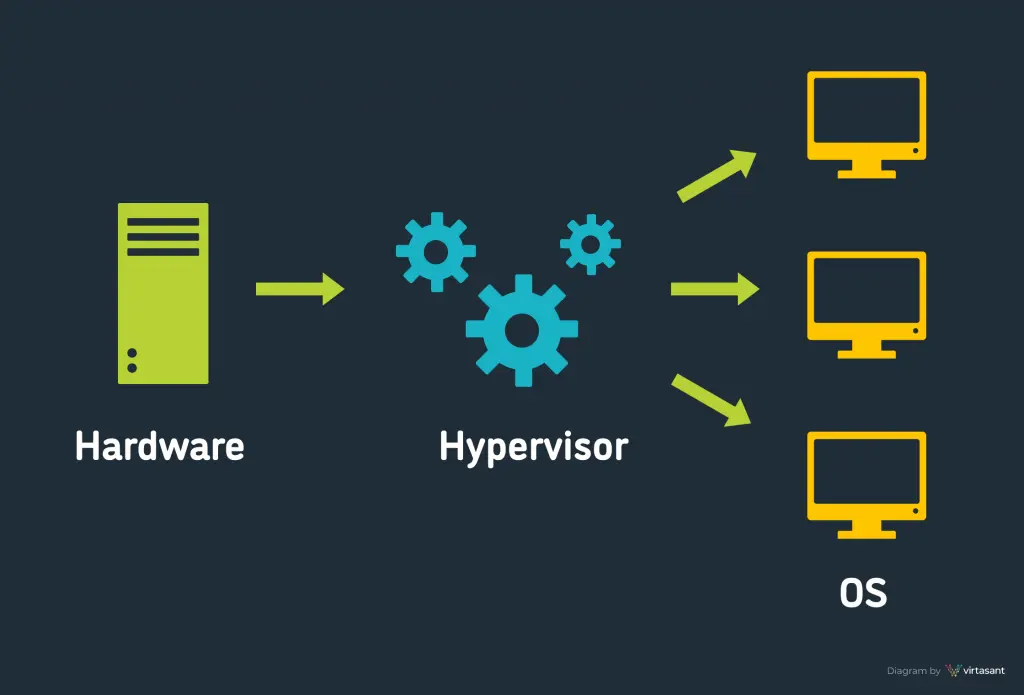

.jpg)


